#yugioh meta
Text
What the hell happened with Crow: an autopsy (Part 3)
Trying my absolute damnedest to finish this one and part four sooner now that I've finally covered the Pearson backstory. *Ehem* Hello again! I hope you're ready for more yelling about a certain spiky-haired Blackbird aficionado, because I sure am.
To get some things out of the way first, though, here come the usual disclaimers:
This is part three of a series of posts about hpw Crow's character was handled during 5Ds' whole run. You can find part one here and part two here. Reading them technically isn't required, but things sure will make a whole lot more sense if you do. (Bring snacks, they're long.)
This post isn't meant as a Crow hate post, nor is it meant to convince people who didn't vibe with his character to change their mind. This is my very long winded-attempt to analyse the writing decisions surrounding his character as best I can, without too much bias. That said, full disclosure, I do personally like Crow, so there's a good chance that will shine through whether I want it to or not. But also, I'm trying to have fun here, so please cut me some slack.
In case you haven't read my previous Crow posts (no shade there) and/or still believe the many, many production rumours that have been haunting the 5Ds fandom since the show's original run, please let me burst your bubble(s) with some insanely comprehensive research by someone over on Reddit (thanks again to @mbg159, who's also here on tumblr): No, Crow was not meant to be a dark signer, or the final boss of season 1, and his spike in screentime has nothing to do with his cards. And also, No, Aki didn't get less presence in the narrative because her VA got pregnant. What if you don't have the time to read either of those long posts? In that case, please take away this simple, very easy rebuttal of why the above theories are bullshit: Their would-be "key points" don't line up with the 5Ds production timeline. At all. Not even vaguely. So please, ditch them, let them die, seeing them still talked about makes me feel like I'm gonna break out in hives. And for the love of god, don't use this post or in fact anything else I post to pit Aki and Crow against each other. Both characters have their strengths and their reasons to love them. I am not the least bit interested in starting any character discourse. So please, spare my sanity. Ok? Thank you.
And now, we can get to the good part at last. In my previous post in this series, I stopped my analysis at episode 95, a.k.a. part two of the Pearson backstory. In this post, I will thus be picking up right after, at the very start of the WRGP—with the Team Unicorn match. The goal for this post is to analyse Crow's part in this particular arc, then provide some food for thought/ideas on how things that rubbed some people the wrong way could have been improved.
More below the readmore, and I give you not just my usual warning, but an extra warning, too: The universe will not let me write short things, so tread with caution, stay hydrated, and expect a veritable dissertation below, because this post feels long even to me, who has long since lost her sense of length when it comes to text. (But I'm well aware this is the result of me refusing to split the WRGP part into two separate posts, so I take full responsibility for that.)
Since we left off right after I chewed through all the issues with Crow's rather belated backstory and especially Black-Winged Dragon last time, we jump right into the thick of things now, with episodes 96 and 97, which serve as the preamble to Team 5Ds' first WRGP duel against Team Unicorn. Crow only gets two major things to do during this short stretch of episodes, the first being that he's Team Unicorn's gateway into roping Yusei into a duel during practice, which helps them set up a ruse that baits the 5Ds gang into sending Jack as their first wheeler because they think Jack's deck is best suited to countering Andre's—which, as it later turns out, it is not.

(Arguably the screenshot where Crow gives off the strongest Youngest Sibling Vibes during the entire show. Look at him, all chastised.)
Crow's second role is an odd one that I argue only he out of the main three guys could fulfill at this point: He's the one to get injured right before the Team Unicorn match, rendering him unable to compete, which leads to Aki offering to take his place for that particular match.
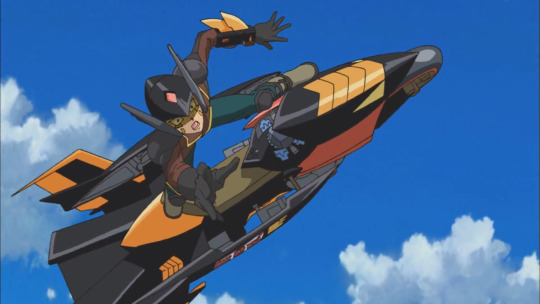
(Pictured: Bird Boy regretting all his life choices up until that point simultaneously.)
Here's the first moment I have to talk about in greater detail. See, the thing is, I don't know what the fandom consensus on Crow getting injured here is, but I argue that this moment was a (rare) strategic decision made by the writers at this point. Crow's injury accomplished several things: 1. It sets up the mystery of why his back wheel locked up out of nowhere, which is later paid off through Team Catastrophe's shenanigans. 2. It organically allows Aki to take his spot without introducing any argument about which of them is "worthier" of having that third spot. 3. Through this, it also allows him to actually bounce off Aki for once (a point I will come back to below, during the Team Catastrophe section). And 4. It allows the show to (TECHNICALLY) pay off the setup they did in letting Aki get her turbo duelling license and train with the boys. (Generally, Crow's and Aki's character writing intersects a bit during the pre-Diablo incident WRGP section, something I'll touch on below.)
Moreover, I think this is also the only match where they could have done something like this, and the reason for it is very simple: Team Unicorn are one-off opponents whose presence in the narrative is only relevant as far as it concerns the WRGP, and they are also one of the first teams the 5Ds gang faces. If we think about the opponents Team 5Ds has after this, it becomes very obvious why Crow could only be injured during this duel: If they had tried pulling this stunt later, it would have forced the writers to pull Aki centre stage during a much more plot-relevant duel than this one (which they were apparently allergic to, but let's not go there), not to speak of the fact that it would have forced them to sideline someone they were definitely trying to sell as the third portion of their protagonist trifecta, which would have probably been awkward. (If not for the fact that they literally did this to Crow later in the show, but I'll get there. Yes, I know there's a lot already that I'll still be "getting to".)
The thing is, whether or not it feels like an awkward writing choice to make so early in the big tournament of this arc (you be the judge of that), Crow's injury finally allows him to have a few interesting character moments for once. For one, there is his immediate disappointment about being forced to stay on the sidelines. Aside from the fact that this is a human and relatable reaction to his injury, it stings even more for the character than it does for us as the audience, because Crow got a moment where the Satellite orphans he previously took care of cheer him on for the tournament literally within the same two Team Unicorn preamble episodes.
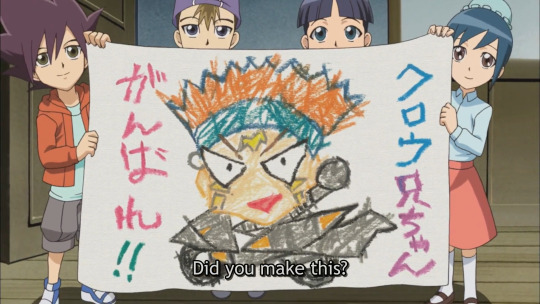
(Say what you will, this is just stupid cute.)
So when Aki eventually offers to take his place during the match, he's understandably apprehensive—and again, this is human. It may seem mean in the moment, but from a character writing standpoint, it's a natural response. Plus, it's certainly more interesting to watch the group have a bit of conflict among themselves, rather than everyone immediately jumping straight to acceptance. It introduces tension, and, for however brief a moment, raises the question of whether Crow might refuse to let Aki take his spot. This is also the point where Aki and Crow's character writing officially intertwines, at least for the stretch of episodes between the Team Unicorn duel and the Team Catastrophe duel. And you know what? Say what you will, but I think it does a world of good for both of them. The 5Ds cast, as lovely as it is, doesn't get a lot of room to bounce off one another where it concerns personal matters anymore, once the WRGP starts. Arguably, they get little time to bounce off one another outside of plot-related discussions at all once this portion of the show comes around. The characters are treated as "fully developed", and thus, the writing largely doesn't take the time to show us how the group naturally interacts with one another anymore, especially not with how many side characters (chiefly Bruno and Sherry), antagonists, and duels the show now has to juggle. So Aki and Crow getting even a smidgen of personal conflict here is honestly a breath of fresh air. The interaction kicked off by Crow's injury isn't completely plot-irrelevant, like most character interactions during the pre-WRGP were, but it's not something that feels like it's only there to explain the machinations of the antagonists to the audience, either.
Let me go through this in a little more detail to illustrate my point.
So, episode 97. Crow storms off after Aki offers to take his spot, while Aki heads out to prepare her runner, intent on helping her team. The personal motivations here are already very nice and reflective of these characters as we've gotten to know them up until this point: Crow's angry and disappointed (mostly at himself, which is noteworthy!) because he can't compete. And specifically, he's angry because not being able to compete in the first match means he can't show the kids his duelling like he wanted to. Then there's Aki, whose offer to take Crow's place is every bit as much of a strategic suggestion as it is a bid for acceptance from her. Acceptance, which is the thing she's been all about ever since she was introduced, basically. So she pleads with her friends to accept her, see her as an equal, and allow her to duel for the team, which they do. And Crow initially throws a fit, but then...
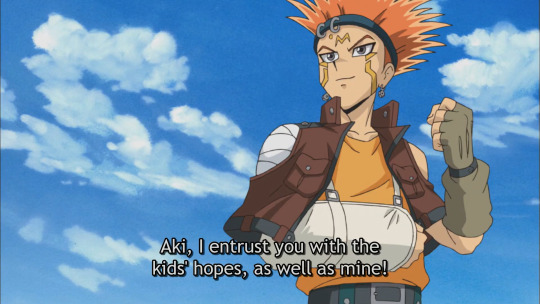
(Listen. You have no idea how much Crow and Aki getting to actually be friends means to me.)
He comes around to the idea and not only gives Aki his express permission to take his spot, he even coaches her a bit right before the match. Moreover, as his text states above, he literally entrusts her with the kids' hopes, as well as his own. This quickly brings both of them full circle: Crow, who already has a theme of legacy attached to him, passes the torch to Aki for this match, and in so doing, offers her the acceptance she asked her teammates for. (Frankly, stuff like this makes me wonder why on earth people were so eager to pit these two against each other, when their shared moments are actually some of the best-written during the often rocky WRGP arc.) So, though this injury pulls Crow out of the duel, it, funnily enough, ties him better into the story and to the other characters.
From there, we then dive into the Team Unicorn match proper. And well, being injured as he is, Crow doesn't exactly get a whole lot to do there. However, since we're in the portion where his and Aki's writing overlaps a bit, I do need to go on a quick tangent about what Aki's portion of this duel means for Crow.
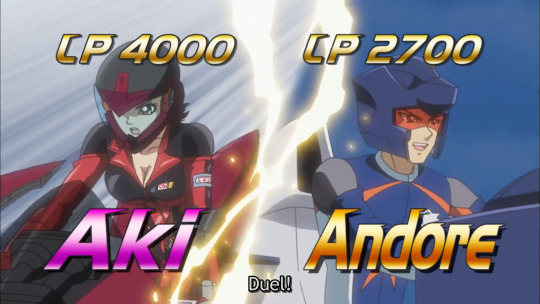
(Sigh. Okay, buckle up for a quick and rough detour.)
First, something I need to get out of the way and off my chest: I have made no secret out of the fact that I hate Aki's portion of this duel, save for the moment where she summons Stardust. Hell, this duel segment is pretty much universally hated by anone who has even a smidgen of sympathy for Aki. It's regarded by many as the very moment the writers axed Aki's character, and for good reason: After all the buildup surrounding her getting her turbo duelling license, the supposed "payoff" of it all is that she gets to duel against Andre for a depressing four turns before being defeated immediately, which leads into Yusei's frustrating portion of this duel, which, to my knowledge, isn't regarded any more kindly by fans than Aki's segment. It's a massive let-down, simply put. But the thing is, it's not just a let-down for Aki. After all, the brief character conflict she had with Crow about taking his spot here can and should be regarded as part of the setup for this moment, and as such, it can also be considered to be wasted the second Aki leaves the track after barely making an impact whatsoever.
However, I do need to mention that I have a theory on why this segment was handled the way it was, mostly because I feel like Crow's later interaction with Aki, shortly after she's out of the duel, underlines it (mind that this is just my personal theory, though, after having watched the show perhaps more times than can be considered sane): I think there is a cultural aspect to this duel. See, the word ganbaru, which anime subtitles often like to translate with "do your best" or something along the lines, has a greater significance than the translation implies. Though it's not inaccurate per se, there's more than just the idea of doing your best behind ganbaru, because it's something like an umbrella term not just for doing your best and succeeding, it's also the idea that you have to keep trying, even if you don't succeed. It's related to tenacity, to persistence, even in the face of terrible odds. And make no mistake, I don't mean the Japanese equivalent of "if at first you don't succeed, try again" here. I genuinely do mean "you have to keep trying, even if you fail". There is no guarantee of success here. And for that reason, the idea behind ganbaru is also that it's not simply the success that has value, but the effort made in the attempt to attain it, regardless of the result. (Side note: I tried to scrounge up a resource I could link to that nicely explains this concept, but unfortunately, all the promising articles were paywalled and the ones I learned it from require institutional access to lecture materials.) And this is where I will posit the tentative theory that this is exactly what the 5Ds writers were going for with Aki's segment of the duel—it was very much meant to be the payoff for her turbo duelling license setup and her plea to take Crow's place, but it wasn't so much her success that was meant to be valued, as the effort she (and by extension, Crow) made for and during this duel. And this is where Crow's little pep-talk with Aki after she's out of the duel comes in, because it feels like it supports exactly this interpretation:
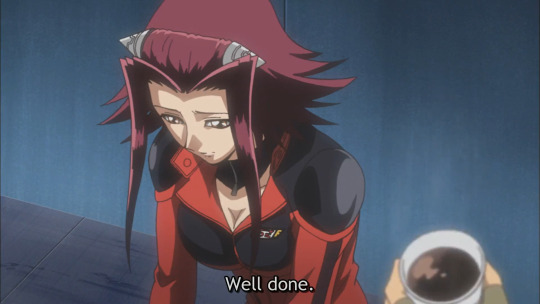
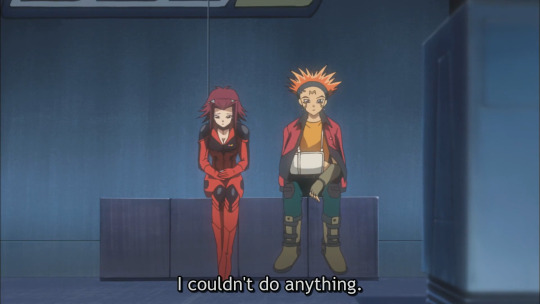
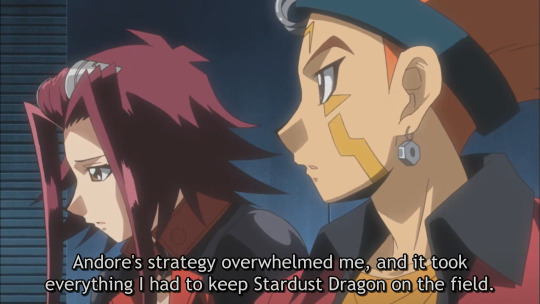
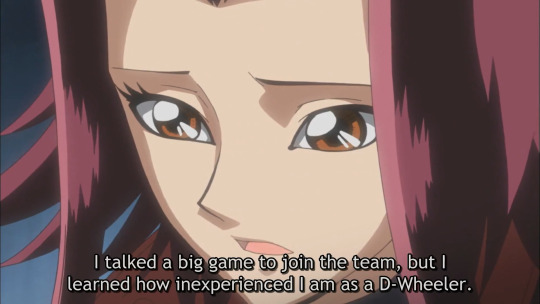
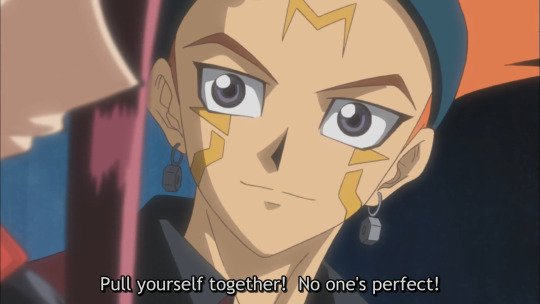


(This is essentially the whole sequence. Note how Crow, despite so fervently entrusting Aki with his and his kids' hopes prior, doesn't admonish her for making a bad showing in the slightest.)
I don't think it gets any clearer than it is here. During this sequence, Aki is painfully aware of how poor her performance was against Andre, especially after she was so insistent on duelling at first, and despite having been entrusted with Stardust by Yusei, to boot. Yet, Crow doesn't have a single word of criticism to offer her. Instead, he even tells her she did well and that nobody's perfect. It very much reads as valuing Aki's effort over the result she achieved to me, and thus seems perfectly in line with the idea behind ganbaru.
However, if we assume I'm correct about the intentions behind this writing choice, we come back to why Aki's segment of the duel is so hotly debated and why it may have arguably been a disservice not just to her, but to Crow, too, character-wise. Because the majority of non-Japanese watchers of the show culturally don't have a 1:1 applicable concept like ganbaru, this writing choice was more likely to fall flat for them, because to someone who wasn't raised to understand the idea behind it, Aki's portion of the duel doesn't register as a payoff; it registers as a massive disappointment, because it feels like the writers, who had so much setup already done for her, let her fail on purpose, just to later let Yusei attain his arguably dumbest victory of the entire show. Thus, they also essentially waste the conflict she had with Crow about whether she would be allowed to take his spot in the first place, because with how little she achieved during the duel, she may as well not have gotten on the track. (Figuratively speaking. Please Do Not take this to mean I would prefer a version where Aki hadn't duelled at all. That would be worse. It would be infinitely worse.)
(Also, side note: If this post reaches anyone who's actually Japanese and still remembers this duel, I would genuinely love your input on whether my interpretation is feasible or just wishful thinking. Did you interpret Aki's part of the duel the way I did here? Or did it fall flat for you, too? If what I'm saying here feels like an absolute reach, please tell me. I'm honestly just trying my best to make things make sense here and remembered this concept from some classes I took in Japanese studies at uni.)
With all that in mind, it doesn't come as a surprise that some people were just as frustrated with the way Crow was barred from duelling here as they were with Aki's segment or Yusei's later victory. But it is what it is—the Unicorn duel concludes the way we all know it to, and with that, the show begins setting up the following duel with Team Catastrophe.
The only other, non duel-related, noteworthy thing that happens between the Unicorn and the Catastrophe match is a brief appearance at the Poppo Time by Sherry, who admonishes the signers for celebrating their victory early and warns them about Iliaster. Why do I bring this up? Because it's one of less than five times that Crow is in the same room with Sherry. Remember, Sherry. The girl he later, during the finale, talks out of working for the big bad evil guy because he suddenly seems to have such a deep understanding of her motivations and character that he can accurately deduce what argument will make her understand that working with Z-ONE won't give her what she's looking for. So, does Crow get a meaningful interaction with her during this scene, then? Nope. Not even in the slightest. Crow says exactly one sentence that is aimed at Sherry during her appearance, and that sentence is this:
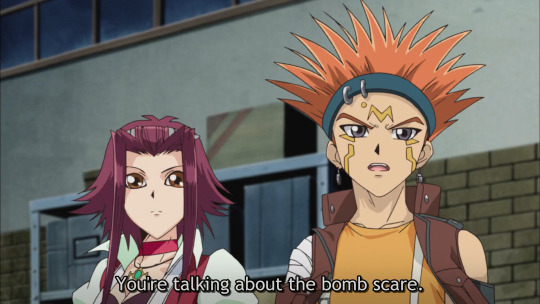
(What a meaningful conversation!)
And yes, I will come back to Crow and Sherry's dynamic in particular. But we'll save that for the Ark Cradle arc post. For now, just keep it in mind as we move along to the other WRGP duels.
So. Team Catasrophe.
During the duel against this team, which was previously only hinted at ominously, the writing for Crow and Aki overlaps again, and this starts with the writers essentially doing a complete switcheroo of what came before: Instead of Crow getting injured and being unable to compete, it's Aki who crashes, ends up in the hospital, and is thus forced to give up her spot during the duel. (This also goes hand in hand with her suddenly losing her powers, which we are given absolutely zero explanation for, but let's not talk about that clusterfuck here. If you're interested in my opinions about that particular trainwreck, I have a rant for you.) Additionally, it's during this stretch of episodes (103-105, which is a whopping four episodes less than Team Unicorn got) that we find out that not only Aki's crash, but Crow's previous one, too, were both sabotage, caused by the rather unscrupulous Team Catastrophe by way of a special card that can cause real damage even when there is no psychic duellist present. (A card we also find out was given to them by Placido/Primo, but this is irrelevant for both Aki and Crow.) Crow's reaction to this piece of information, particularly once Aki gets injured due to the same thing, is where things get interesting for him again, because he gets pissed, to say the least.

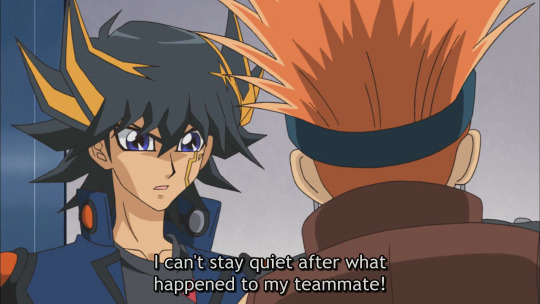
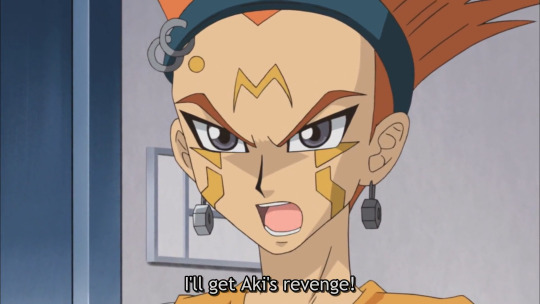
(A moment I imagine firebirdshippers must have been positively delighted about.)
Here, I have to reiterate an earlier point: Think what you will of Team Catastrophe, of Aki's crash, and of the sequence where her powers suddenly don't work, but this moment here, where Crow gets angry on her behalf and swears to duel Team Catastrophe into submission—not because he wants his kids to cheer for him, or because he wants to prove himself, but as revenge for his friend—is one of sadly only a handful of moments the writers use to show the strengthened relationships between the individual members of Team 5Ds after the dark signers arc. It's one of the precious few scenes that actually shows, rather than tells us or lets us search for scraps in the subtext, that the signers, and the members of Team 5Ds as a whole, care for each other outside of revolving around Yusei like planets around the sun. Even if it's laughably small, it's at least a hint that there are individual friendships between the other signers, too, that they all stick around one another for reasons beyond gravitating towards Yusei for one reason or another. And for that alone, I'm grateful that they put this here, even if Team Catastrophe was otherwise so ridiculous and made such a bad showing at their actual match that they could barely be taken seriously as antagonists at all.
Speaking of which. The actual meat of the matter. The Team Catastrophe match. What does Crow do here? Well, he duels! Even though he wasn't supposed to, for injury-related reasons. What both his participation as well as the actual duel accomplish, though, are that they not only showcase previously established character traits of Crow's again, but they also make a (possibly unintended) callback to a previous, major duel Crow took part in: His dark signer duel against Bommer/Greiger. Where and how? Let's see.
Firstly, Crow's participation. The reactions of the other characters to this make it very evident that Team 5Ds did not plan for this, with Yusei and Jack even going as far as to say they "had no choice" but to let Crow duel, because he insisted. This is perfectly in line with the stubbornness we already know from him at this point—a stubbornness that was also a major reason for why he took Bommer on and later continued his duel with said man, despite Yusei showing up and telling him he shouldn't be duelling a dark signer.
Secondly, there's the manoeuvring thing, and here's where I can call attention to a fun tidbit: The WRGP isn't what introduces the concept of manual mode during turbo duels to the audience. It's Crow. During his duel with Bommer. Being crafty and a bit shrewd as he is, Crow, during said duel in the DS arc, purposefully switches to manual mode when he duels Bommer, because he figures that attacks that can deal real damage can probably be evaded if you actually have control over your runner and aren't stuck in autopilot.

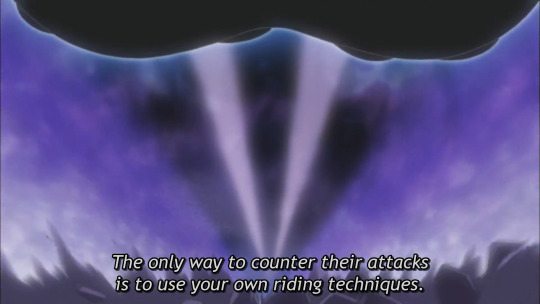
(Don't believe me? Here it is. And frankly, it is somewhat hilarious, yet also very fitting that Crow is the only one who thinks to do this during a duel with a dark signer.)
The reason this particular bit is relevant during the Team Catastrophe duel is because Crow essentially repeats this trick here. Of course, it's a bit less impactful now, given that manual mode is standard for WRGP duels, but still: Due to Hook, the Hidden Knight, Crow is forced to pay attention to the track and manually evade the monster's attempts to make his back wheel lock up during the duel, mirroring how he thought to manually evade Bommer's attacks during the DS arc.
Thirdly, there's the revenge angle, and this one is a particularly juicy callback. Remember, Crow's major reason for taking on Team Catastrophe, despite being injured, is that he wants to get revenge for Aki. This directly parallels how his major reason for duelling Bommer during the DS arc was that he wanted revenge for his kids, whom he believed to be dead at that point in time. (It also, interestingly, establishes a bit of a connection to his deck, which boasts a fair amount of revenge effects, but I'll not get into that here, seeing as I've talked about Crow's cards a bit before.)
Keep in mind, despite all the things listed above that this duel accomplishes, it's also by far the shortest WRGP duel. It lasts a whole six turns, total, which is ludicrous compared to the likes of 27-turn Team Unicorn, 26-turn Team Taiyou, or 25-turn Team Ragnarok. And I don't think it's controversial to say that the Catastrophe guys are probably the most forgettable WRGP Team, too. Yet, somehow, despite all its shortcomings in terms of memorable antagonists and plot relevance, this is one of the best duels of the WRGP where Crow's character writing is concerned. Now, I'll be perfectly candid: Coming into this post, I did not expect the Team Catastrophe duel, of all things, to end up being as good at actually showcasing Crow's character and his ties to other characters (who aren't Yusei) as it was, but here we are. And we had better hold on to the good the Team Unicorn - Catastrophe segment did for Crow, because the next thing that's coming up is a harsh break from the WRGP, starting with the sudden appearance of Placido's home-engineered army of killer duel robots. And what does Crow get to do during this part?
Uh. Well.
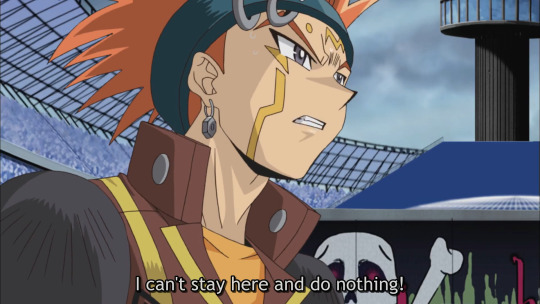
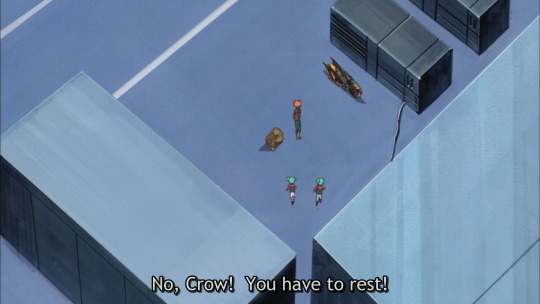
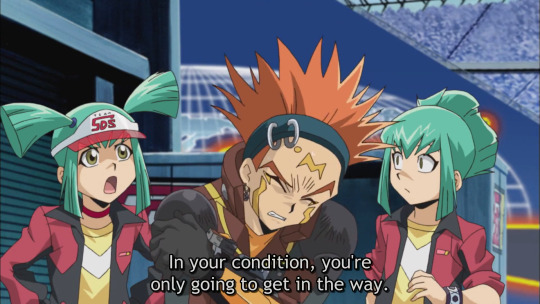
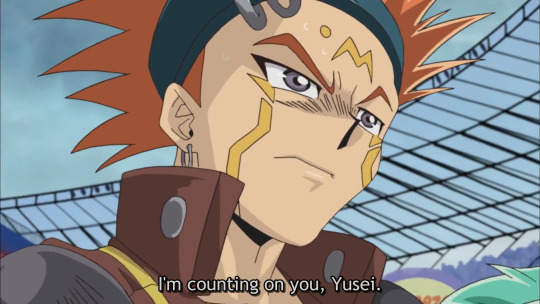
(Pictured: Bird Boy being demoted to benchwarmer while the city's being ransacked by murder duel robots.)
Nothing. A whole lot of nothing, is what.
During the duel robot invasion, we only ever flash back to Crow to ascertain that he is, in fact, useless during this part of the show, something he shares in common with Ruka, Rua, and Aki here, because all of them get pretty much nothing to do while Yusei finally gets the hang of accel synchro. Granted, Aki gets to save a little girl at the hospital, but in comparison to Yusei's lengthy, plot-heavy duel with Placido, this feels like a consolation prize. And for once, Jack is only marginally better off, too, because sure, he gets to beat up a couple of robots, but that's it, really.
Where Crow is concerned, his plot relevance doesn't actually resume once the Placido duel finishes, though. (And neither does Rua's, Ruka's, or Aki's, while we're at it.) Because wouldn't you know it, the next big thing directly after the duel robot invasion are the Red Nova episodes, where three out of five signers (Crow, Aki, and Ruka, unsurprisingly) are removed from the screen almost in their entirety again while Jack gets his much-needed dragon upgrade so he can keep up with Yusei, in order to uphold his status as a classic, almost-evenly-matched yugioh rival.
Speaking of upgrades and dragons, let's make a quick detour while our protag and rival duo take their express vacation to the Nazca plains. It is, of course, no secret that no signer outside of Yusei and Jack ever got a dragon upgrade within the anime. (No, I'm not forgetting about Life Stream Dragon. But that one, unlike Shooting Star Dragon and Red Nova Dragon, was a.) teased all the way back in the DS arc and b.) didn't have a unique summoning method or some other gimmick that made it an "elevated" synchro. So I'm discounting Life Stream as a "proper" dragon upgrade on purpose.) Is this the point where I start arguing that Crow should have gotten one, then? Well, not quite. Not with the writing the show canonically gave us, at least—after all, with how late Black-Winged Dragon was introduced, it would have been bonkers to upgrade him here already, if even at all. However, I do argue that the way the show hands only Yusei and Jack upgrades seems a bit... off. Now, I know why only those two get upgrades, or at least I think I do. After all, they're the central protag/rival duo, and within the framework of the character archetypes the larger yugioh canon has created for itself, this would have always made them the first, if not the only candidates for dragon upgrades. What feels a bit off to me, though, is that specifically the 5Ds cast feels like it... chafes a bit against those character archetypes, for lack of a better word. The problem is this: The signers, as far as the first two arcs are concerned, are sold to us as equals who all have very powerful ace monsters. Yes, Jack and Yusei are still undoubtedly the best duellists among them, but not on account of having uber-powerful extra special monsters that were acquired through supernatural means that are categorically inaccessible to the other signers. However, with the appearance of Shooting Star and Red Nova, this changes. While Yusei and Jack were previously and would have always been the two guys who had a Special dynamic with a capital "S" on account of their character archetypes, their acquisition of the dragon upgrades—and even more so, the lack of upgrades their fellow signers receive—now decidedly puts them in a different power bracket and skews the balance between previous, supposedly "equal" characters. (Which, unfortunately, is yet another thing that makes everyone else easier to sideline.)
Why do I bring all this up in a post dedicated to Crow? Because this new power imbalance arguably impacts him more than the other signers—because he's Team 5Ds' second wheeler and doesn't miss another WRGP match from here on out. Thus, that power imbalance is felt in the upcoming duels, where Yusei and Jack bust out Shooting Star and Red Nova like it's nothing, while Crow is left manoeuvring with the somewhat underpowered Black-Winged Dragon and whatever else he can come up with. This is also why I claimed that the show did sideline Crow in some aspects further above. Because while some parts of his writing go to great pains to establish him as part of a protagonist trifecta that is now supposed to take centre stage before the other characters, he also permanently lives in Jack and Yusei's shadow, ultimately barred not just from reaching equal status as a signer (due to his late and rocky introduction and dragon acquisition), but also barred from becoming the equal of his foster brothers as a duellist. Frankly, I'm surprised the show didn't make this a plot point, because the first thing my mind jumps to when I think about this is whether Crow felt left behind after his brothers acquired such immensely powerful, special cards. But more on my personal writing ideas later. For now, let's just put a pin in the power-imbalance thing.
So, when is Crow back on screen in any meaningful role, then? (Note that I mean this as literally as possible. As per my discussion about "screentime" and my gripes about it in part two, I gloss over the parts where Crow is on screen, but could be traded for any other signer or even a lamppost without affecting the scene at all.)
Well, the next thing Crow gets to do isn't exactly glorious, but it sure is funny.
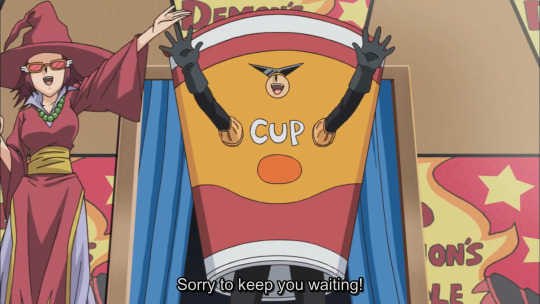
(I want you all to remember that he has to wear this costume and play this part in Team 5Ds' absurd plan to capture Yaeger/Lazar because he lost at rock-paper-scissors. This will never not be funny to me.)
Ignoring the hilarious outfit and Crow playing the bait at a fabricated cup ramen promo event meant to lure Yaeger in, bird boy does actually get something that's not just for funsies to do during the two episodes where Team 5Ds is trying to get more information about Iliaster: He gets to have a duel revanche against Yaeger, who, if we remember the DS arc, ditched him the last time they squared off. Much like the Team Catastrophe duel, this one, too, calls back to previous duels Crow has had: For one, it's the obvious conclusion to his unfinished, first duel with Yaeger. And for two, Crow repeats a "trick" (for lack of a better term) here that is also unique to him: losing on purpose, which we remember from his duel with Lyndon.
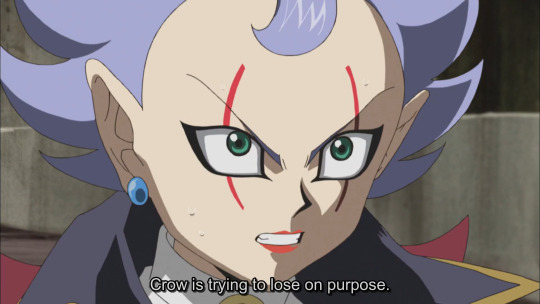
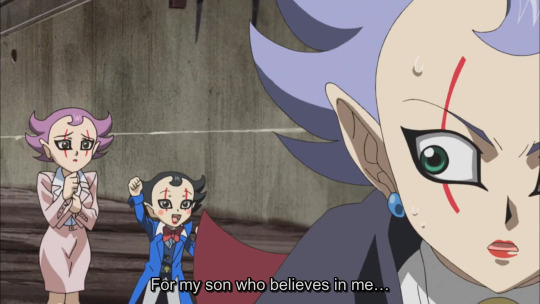
(Identical-looking clown family jumpscare be upon ye.)
And again, much like getting injured for the Team Unicorn duel, I argue that this story beat here is something that could also only have been accomplished with Crow. Because he's the only one who has previously duelled Yaeger, firstly, because not wanting to make a child cry by beating their dad in a duel makes sense for him as a character due to him being a family-oriented person who loves children, secondly, and because losing on purpose in this scenario is a tactic that would seem out of character from anyone else, thirdly. (We recall, the only times Jack and Yusei, respectively, ever consider/offer to lose on purpose is when the lives of people close to them are on the line, in the shape of Carly/Rally. As for the others, aside from not being present, Aki, Rua, and Ruka are so heavily sidelined at this point that they would have never been an option for this. And if his writing is anything to go by, Bruno is mostly purposefully forbidden from accomplishing Plot Things, especially through duels, while he's Bruno.) But hey, due to the way this episode is set up, losing on purpose works out for Crow, because it convinces Yaeger to stop hiding and actually share his knowledge about Iliaster. This, by the way, is the second scene where Crow gets to be in a room with Sherry for a longer stretch of time. And look, him joking that Sherry might kill Yaeger if he doesn't spill the beans about Iliaster soon is fun and all, but in light of the Ark Cradle duel later, I have to point out that he, again, doesn't get to have so much as a shred of a meaningful conversation with Sherry here. Again. But moving on. The scene with Yaeger at the Poppo Time then leads us first to the small sequence in the arcade where the gang has to win a simulated duel to get Yaeger's encoded intel, then to episode 116—the Moment Express episode, where, due to this being a Yusei, Sherry, and Bruno-focussed episode, Crow gets nothing to do again. (And also doesn't get to interact with Sherry again.)
Congrats! We've survived the WRGP break. This leaves us with three more WRGP duels before shit hits the fan and the Ark Cradle arc commences. And full disclosure, I'll be doing a bit of a quick-fire round of those three duels. Why? Because despite them all having their merits in their own rights (they're the better liked duels of the WRGP for a reason), there honestly isn't that much focus on Crow during them. He duels, yes, and I've seen people point this out over and over again as the supposed smoking gun that shows how Crow had so much more relevance and screentime than Aki and yadda, yadda. We've been there. And it's not that I can't see where this argument is coming from—I'll be the first to tell you that it's a travesty that Aki never got to duel in the WRGP again outside of the Unicorn match. But I want to use the final three matches to dig into how the way these matches—and especially the opponents to go with them—were set up made it nearly impossible for Aki to replace Crow again during any point of the WRGP finals.
First, episode 118. This is the only preamble episode we get for the first two WRGP finals teams, and here, our group is split in two: Yusei, Bruno, and Rua introduce us to Team Taiyou, while Jack, Aki, and Crow introduce us to Team Ragnarok. There isn't much to say here, because the only thing this episode does for Crow is a shallow repeat of what the Team Catastrophe duel did: By putting him in a group with Aki and Jack, and letting them decide among themselves, independently, to check out the exhibition match, it implies that he voluntarily spends time with signers who aren't Yusei. Thumbs up. Gold star. You made an effort (I guess). Then, the real fun starts.
Round one. Team Taiyou.
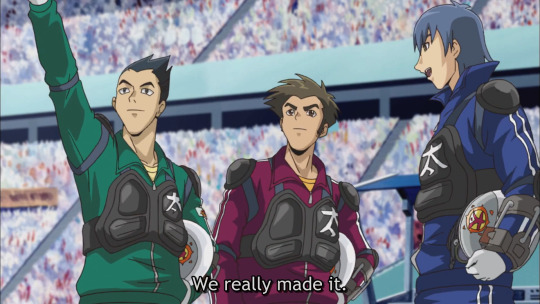
(Pictured: The sweetest country bumpkins to ever grace this earth. Yes, I'm biased.)
So here's the deal with Team Taiyou, from a narrative standpoint, as best as I can grasp it: They are a callback to Team 5Ds' roots. Specifically, to the boys' Satellite roots. The Taiyou boys come from humble origins, have only one, mostly home-engineered duel runner, and play using old cards that are widely considered shitty, as 5Ds canon tells us. They are essentially the non-signer, countryside version of what Jack, Crow, and Yusei once were, which is why this is the first duel where the duellist constellation on Team 5Ds' end couldn't possibly have been altered. Team Taiyou is there to remind us where our boys started, so it has to be our boys duelling them. This also goes for Crow, even though this duel otherwise doesn't accomplish much for him, character-wise. Instead, it's more of a narrative wink at the audience, as well as providing a breather between otherwise extremely tense, plot-focussed duels. But yeah, Crow's part in this match isn't much to write home about; he doesn't get any verbal interactions that are very meaningful to his character, can't get so much as a scratch in on Zushin, even with Black-Winged Dragon, and is defeated so Yusei can take out the legendary giant.
Round two. Team Ragnarok.

(Behold the pizzazz of at least two contenders for Haircuts With The Most Spikes in the show.)
Though this duel is framed as being even more so aimed towards bolstering Jack's character writing than Crow's, given the inclusion of Dragan's personal history with Jack, Team Ragnarok gets significantly more interesting for Crow again than Team Taiyou did. This is, of course, mainly because of Brave/Broder. Where Team Taiyou were a callback to the 5Ds boys' roots, Team Ragnarok are their narrative foils. Dragan is the duellist who lost his pride to contrast Jack, who's brimming with pride at all times, and Harald/Halldor is essentially the rich, "destiny isn't bullshit, actually" version of Yusei. Meanwhile, unlike the first two, who highlight our 5Ds boys' characteristics by contrasting them, Brave acts as Crow's mirror. Through Team Ragnarok's flashbacks, we see that he gets almost exactly the same, lovable-rogue-type backstory that Crow did during the DS arc, just in a different setting. The only, major difference between them is that while Crow is more down-to-earth, Brave likes to be pretty flashy.
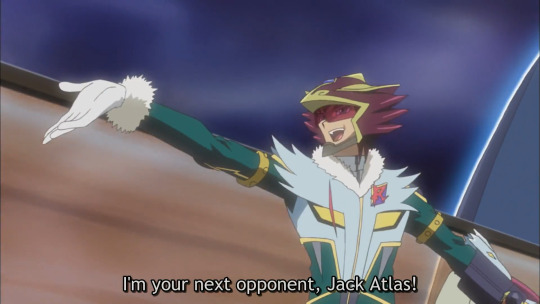
(Keep in mind that he's doing this on a runner. Is there such a thing as courses on how to do acrobatics on your runner? Like there are courses for vaulting on horseback irl? I'm overthinking this again.)
Unsurprisingly, the duel thus ends up addressing the similarities between Crow and Brave, mostly through two things: One, the duel essentially becomes a contest of who can out-trickster who, culminating in the famous, ridiculous-in-the-good-way sequence where Crow activates a trap from his graveyard, to the shock of pretty much everyone present. And two, despite being on opposite sides, the two bond over their concern for the children they took care of and their concern for children in general, which is expressed most clearly in the scene where Crow's kids, in an attempt to hold the poster they made for him higher, very nearly fall over the barricade in the WRGP stands. Despite the hefty length of the full duel, these are pretty much the only things actually related to Crow's character that come up, though. They're good, don't get me wrong, but in a duel that is otherwise this dense with plot, Aesir shenanigans, and Iliaster foreshadowing, it's no surprise that the duel doesn't add that much to Crow's character, outside of giving him someone he can bounce off very well and relate to. Again, though, we are faced with the same situation as with Team Taiyou: Due to the way the members of Team Ragnarok are written, meant to contrast/parallel one male duellist each from Team 5Ds, nobody other than Crow could have taken the third spot here, either. It would have felt awkward from a narrative standpoint (as much as I would have loved to see Aki duel more).
Now, finally. Round three. Team New World.
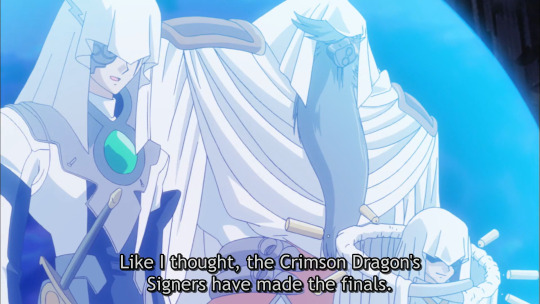
(Welp. Here come the robots.)
I had to check to make sure I wasn't misremembering this, but due to the way this duel was set up so José/Jakob could bust out Meklord Emperor Granel with a ridiculous amount of attack points, Crow gets a resounding four turns total in this duel. (Gee, I wonder which other character got this treatment during a WRGP duel.) During those four turns, there are only two things he accomplishes: One, leaving behind two combo pieces Yusei later uses, and two, showcasing the shrewd tactics that earned him the label of "trickster" during the Ragnarok duel by bringing out a non-synchro monster that can take advantage of a synchro monster's attack points and effects—Aurora the Northern Lights. And arguably, this is a very smart play, moreover, it's the only time anyone in the show has the bright idea to not use synchro monsters against the known and feared synchro-killer Meklords. Unfortunately, as smart as it is, the narrative doesn't reward Crow for this play—José all but shrugs what could have been a turning point in the duel off, then proceeds to steamroll Crow the next turn, leaving Yusei to score the win, as usual. To get back to the "Crow got so much more screentime than Aki during the WRGP" thing for a second, of all the duels in the WRGP finals, this is arguably the one where Aki could still most easily have taken Crow's spot again, because here, it doesn't matter whether it's him or someone else, as this duel isn't tied to his character in any way. Unfortunately, due to the Granel-steamroller-strategy, this is also the duel where letting Aki take his spot again would have been the biggest shot in the foot, because unless they had changed Team New World's strategy, Aki would have gotten brutally guillotined here, same as Crow—something I can't imagine anyone, not even people who hate Crow, being happy about.
With that, though, we've finally made it through the WRGP. So, what's the bottom line here? Frankly, speaking from my own interpretation, Crow occupies an... odd spot during this tournament, to say the least. Though he does get to duel the majority of the time, few of the duels actually cater to his character in any way. Moreover, he only gets to be the star of the show in a WRGP duel once, during the by far most forgettable match against Team Catastrophe. And mind that I use the term "star of the show" very loosely here, because the problem the WRGP arc as a whole has, in my opinion, is that the rather lame Team Catastrophe duel is the only one in the whole tournament that isn't won by Yusei, which categorically means that any of the other character's big moments are usually undermined by the fact that they ultimately still need him to save the day. Thus, moments like Aki summoning Stardust Dragon and Crow using an anti-synchro-killer strategy that for once actually forgoes synchros are somewhat cheapened by the fact that they're not actually the turning-point moments they're initially painted as, because ultimately, Yusei always has to be the one to save the day. What's worse is that this almost feels like a bit of a non-issue that could have easily been fixed—given that the show tells us that teams can shuffle around their line-up for a match any time. But unfortunately, the writing never interacts with this as a possible strategic element, nor does it ever seem to consider letting Yusei lose, or forcing him to give up his spot for a match. I feel the need to say that I don't put the blame at Yusei's feet here, though: This strongly feels like an oversight by the writers, and perhaps a disproportionate need to have a nigh-infallible protagonist (on the duelling side of things) that their audience would never run the risk of calling "lame". For Crow, though, this chiefly means one thing: In any duel other than the Catastrophe one, it was always clear that even if he partook, he would never finish the match. And yes, this is technically an issue Jack has, too. But this is where the character writing outside of the duels comes into play, too.
Unlike Jack, who actually gets to do something during the Diablo invasion (albeit very little), who gets his very own dragon upgrade and who gets a very personal, pre-duel plot with Dragan, the show's writing doesn't bother giving Crow a lot of plot- or character-relevant things to do, once the WRGP starts. This is also why I was so surprised at how much the Unicorn and Catastrophe duels embrace his interactions with Aki—compared to the later duels in the finals, this portion still makes Crow feel genuinely relevant and interwoven with the other characters. Meanwhile, out of the three final duels, only the Ragnarok one actually tries to establish a connection to his characterisation, through Brave. The Taiyou duel only sets itself up in such a way that Aki partaking instead of him would have been awkward. Meanwhile, the New World duel just has him being treated like a floormat in a sad parallel to Aki during the Unicorn duel, seeing as they both get a nice moment where it looks like they might turn the duel around (Aki summoning Stardust Dragon and Black Rose Dragon onto the field at the same time; Crow summoning Aurora the Northern Lights, which couldn't be absorbed by the Meklords), only to have their hopes dashed as they're mercilessly cleared off the track. Outside of the duels, many scenes sadly give the impression that they may as well not have included Crow, though—he often gets so little to contribute to a moment or even to say at all that substituting him with a cardboard box seems like it would not have impacted the scene in any way. And that's without addressing his non-existent connection to Sherry, which feels extra glaring, given his later interactions with her on the Ark Cradle.
All in all, the WRGP feels like a very mixed bag, where Crow's character writing is concerned. His belated backstory, which I talked about in part two, is front-loaded and asks as many questions as it answers. Then the tournament commences, gives him some actually decent character interplay with Aki for once (at the cost of letting her succeed in the tournament, it seems), only for him to be basically irrelevant during the WRGP pause again. And once the whole thing resumes, it becomes this hot-and-cold thing where some duel aspects seem tailored to him, while others treat him as completely expendable. The end result is an arc where I'm left wondering why exactly the writers felt the need to make it seem like Crow made up one portion of a protagonist trifecta, if they never actually bothered treating him as equal to the other two. (The answer, I believe, lies somewhere between the fumbled setup they did for him during the Fortune Cup and DS arc, and the way yugioh in general treats its character archetypes. But that's just speculation on my part.) The one, saving grace the WRGP (outside of the Pearson backstory) has for Crow is that it at least doesn't introduce any new character- and/or timeline inconsistencies. In fact, his character stays remarkably true to form once the tournament begins.
Okay, onto the final bit, then. As I've done in both previous posts, let me delve into completely subjective territory and offer some ideas on how this arc could have been handled to make it seem a little less all over the place with Crow. And since his writing here canonically intersects with Aki's several times, let me try to do it while offering the best of both worlds to both characters, if I can.
As far as Crow's backstory is concerned, I've already offered my solutions to that in part two. Now, to stay consistent with my own suggestions, I'll try to branch off what I wrote in the last post. This means that, as per my previous two analyses, we're dealing with two scenarios again: One, Crow stays a signer and we try to touch canon as little as possible. Two, Crow isn't a signer and we adjust canon in whatever way we need to to make him feel interesting and necessary despite/because of that.
First, though, let's get two adjustments I personally would have made in both versions out of the way:
The way the WRGP is structured puts every character that isn't Yusei at a massive disadvantage, where character moments in duels are concerned. Thus, I propose an overhaul. Among the changes I think could have benefitted the characters (yes, all of them) are: One - Aki actually getting to accomplish something during the Unicorn duel (she can and should still have her moments with Crow, but maybe let her portion of the duel end in her thanking him for coaching her, creating a more upbeat scene that strengthens their friendship, which could double as good setup for their later double-duel against Sherry). Two - letting the Team Catastrophe duel actually play out properly (as in, they become more meaningful as opponents by having a better strategy, for example, and Crow could stick it out longer against them, in order to make this more so his win than Jack's. Also, why not let Aki actually see him get back at Team Catastrophe for her?). Three - giving Crow an actual character moment during the Taiyou duel (what if one of the country boys had played a card or two of the ones he learned to read from? It could have helped drive the parallel between the two teams home.) Four - letting Crow's anti-Meklord strategy get at least a little payoff, if only for two turns (show us at least proof of concept, damn it!). Yes, the Ragnarok duel is the only one I wouldn't rewrite (unless special circumstances are introduced, see below). Additionally, let Team 5Ds alter their line-up more than once, damn it. Let them actually strategise about the duels, let them take into consideration who should go first when and whose deck might be better suited to which scenario. Also, remove Yusei from at least one duel. Doesn't matter how, just let him not partake once. Perfect setup to let Aki duel again, and would also allow for spicy character interactions. (Arguably the best duels where this could have been done would have been any of the final duels, though it would have also required rewriting the antagonists somewhat in any case.)
For the love of god, give Sherry and Crow some setup. Let them actually interact, let them introduce their philosophies to one another, just do something, anything to make Crow understanding and talking sense into her during the finale seem earned. A few chance meetings, or maybe even a tiny side-plot could have done so much here. And if you can't let them interact outright, at least let Aki and Crow talk about Sherry! Double whammy! The two characters who end up duelling against her are made to seem even more like a team, and Crow actually gets to find out what Sherry's deal is on-screen. Just. Set. it. up. I beg you.
There we go. Now, onto the two branches.
Option A: Crow stays a signer and obtained Black-Winged Dragon.
Seeing as Crow's signer status, funnily enough, isn't all that relevant during the tournament itself (save for two notable exceptions), there aren't that many fixes to be made here. Crow can still get injured, miss out on the Unicorn duel and be the star of the Catastrophe duel. But giving him something to do during the duel robot invasion that isn't standing around and hoping Yusei will fix everything would also be nice. It's fine if he can't drive out there and duel, but why not let him do something else? He's a crafty guy, why not let him find, say, a way to fry the Diablos' runners, taking a few of them out even from a semi-stationary position without duelling them? He could at least get as much of a consolation prize scene as Aki got with her saving that child. Then there's Team Taiyou, which, save for what I proposed above, is a duel that doesn't feel like it needs changes. Crow does his thing here. That's it. The same goes for Team Ragnarok, especially given that they're specifically written to oppose an all-signers Team 5Ds. Finally, there's Team New World, which, if I'm being completely candid, I would personally overhaul to change the cyborgs' strategy entirely in order to actually let all three members of Team 5Ds shine. But this is the version where I touch canon as little as possible, so... Aside from what I wrote above, no changes needed. Just make Crow seem a little more relevant, make his strategy have at least a little payoff, even if Granel's back out and menacing literally two turns later.
Option B: Crow, as per my previous posts, isn't a signer and doesn't have Black-Winged Dragon.
This is the version that would categorically require heavier changes, though they honestly don't arrive until the break in the tournament. Unicorn and Catastrophe stay the same, I would still propose that Crow gets to be a little more useful during the Diablo invasion. But! In this version, seeing as he never acquired BWD, the break in the WRGP would be an excellent spot to let Crow acquire an upgrade for his beefy Blackwing ace monster of choice. Give him a little side-plot, too, something to do, something where he proves himself. Maybe let him run into Iliaster here, or maybe call back to Pearson again and introduce the new Blackwing upgrade as a treasure Pearson stashed away before he died (maybe this could have even been the card Bolger was actually after; the world is our oyster here). Then he's beefed up, too, and actually feels a little more on the same level as Jack and Yusei. The tournament recommences and again, the Taiyou duel could stay mostly the same, I think. Ragnarok and New World are where it gets really interesting, though. The way I see it, Ragnarok could go two ways with Crow not being a signer: Either he partakes as he did in canon and his non-signer status is called out as a peculiarity by our Swedish boys who happen to be obsessed with fate (which would make his performance against Brave seem all the more impressive), or, due to this being a duel all about destiny and celestial pissing contests, Crow's spot is given to Aki again for this duel due to her signer status (this would, obviously, require rewriting Brave, perhaps even switching him out for a Ragnarok lady instead). As for Team New World, this duel would honestly be a lot more juicy with a non-signer Crow, because much like he was for the dark signers, a non-signer Crow would essentially be an unknown in their plan for the cyborgs. He would be the guy who's Not Supposed To Be Here. Granted, he would still be beaten, but he could still get an excellent moment where his out-of-left-field anti-Meklord strategy genuinely seems to turn the tables for a bit, angering José and providing even stronger setup for Yusei to win later.
Aaaaand that's that. Somehow, I get the feeling the WRGP had the least things that needed fixing because it also had the least actual character writing. But that might just be me. It's late and I have been writing for A While. But hey, I got out part three faster than part two! I consider that an achievement.
Now, while I get my talking points in order for part four, I hope you'll have fun chewing on this one. See you in the grand finale to my Bird Boy dissertation.
#yugioh 5ds#crow hogan#ygo 5ds#5ds#yugioh meta#team unicorn#team catastrophe#team taiyou#team ragnarok#team new world#holy shit my brain is smoking#so. much. stuff to talk about.#the irony that I'm posting an analysis of this length about crow#on a blog with an aki theme is not lost on me#listen I love them both. they are so good.#and tbh I think I made it abundantly clear that I do here#they are friends. they don't need to fight.#also again if anyone wants to use my fix suggestions as fic premises#please do and tag me if you publish it#anyway *yeets this out into the wild* take it
39 notes
·
View notes
Text
Who Am I?
An Introduction: Setting the Game Board.
“You are the only Yuugi Mutou in the whole world.”
This is, perhaps, the most important line in the series. A penultimate affirmation, a triumphant declaration. There is, in this line, the knowledge of standing across from someone, and being able to see them as themselves. To be able to know the answer to “who are you?” To look at someone, and be able to answer that question.
“Who am I?”
“I am the only Yuugi Mutou in the whole world.”
This is the axis in which this world turns, to answer the questions “who are you,” and “who am I?” Taking a lens to this question--that is, the question of “who am I?” and how it is explored through the series Yu-Gi-Oh!--lands on the walking metaphor of identity, memory, history, and personhood that is the Spirit of the Millennium Puzzle, and how this character is used as a lens of identity--particularly in contrast to the main character himself, Yuugi Mutou.
This essay series itself will seek the answer that question for the Spirit of the Puzzle, not in a literal sense (for his birth name, Pharaoh Atem, is well-known enough of a spoiler that Duel Links features his name in the DSOD map, spoken by Yuugi) but in a sense of identity exploration, relationship exploration, thematic exploration, as well as a literal history and personality exploration that the series keeps purposefully vague, in the name of presenting the character the same way he is experienced by the characters in the story--as a person whom is gradually uncovered. As the heart of a mystery, as the unanswered riddle of the majority of the story.
(“Something you can see, but you can’t see.”)
This is the riddle at the heart of the story, answered in different ways and by different characters,
and one of the ways this riddle is answered is by the name Atem.
But first, every game has rules.
First and foremost, this world is simply not the same as our own. Nightmare Masterclass put it better in his video on “This House Has People In It,” (which I advise for understanding the lens of magical realism, and how it is used in the genre of fiction) but I will be working in the genre of magical realism as a way to analyze this story. I simply have no interest in doing a CinemaSins style ding! for every time the world of Yu-Gi-Oh! does not match with the understanding of our own world. Going into this story, you simply have to accept that Seto Kaiba has the influence and money and resources to buy out an entire city for two days, build a space station with a space elevator, and hold a death tournament on live broadcast and walk away without a care in the world. You have to accept that Destiny Draw is a duelist skill in this world, and that it is a recognized thing within the setting. You have to accept that every game is an expression of a battle between wizards over destiny, and that there is no such thing as a casual game between friends as long as magic exists in this world. You have to accept the roving Yo-Yo! gangs, children getting their hands on guns and holding people at knife point over toys, and the fact that the systems we know about (mental health, law enforcement, government, etc.) simply do not come into the picture at any point in this story. There will be no speculation on why this is, or why the characters did not act on these systems. Any discussion will be a pre-emptive argument on why these systems were not used or acted upon in the minds of characters or the powers in place that would, in our own world, step in. The world, as it is set in Yu-Gi-Oh!, is a world where games decide the outcome of the fate of countries, governments, and the fate of humanity itself. It was laid out on page one. This world runs off of games, all other systems of power come secondary to the mystical and magical nature of this world system.
Following that, the story will also be analyzed with an understanding of the logic of the world and characters determined by their own thoughts, feelings, and actions, as well as the system that the story decides to judge characters on, and why it is done that way. It will be up to the reader to decide why and how a character should be judged. For example, a reader might find Sozoji (the bully from the karaoke chapter) much more sympathetic than Pegasus, because Sozoji objectively did less damaging things than Pegasus. However, that is purely up to the reader to decide. This series of essays will not be written to lecture a person on characters, whom a person should like, whom a person should dislike, or, following that, any judgment on a person based on that. A person’s own values are determined by their own life circumstances, by their own truth, and by their own heart. A person’s past and future are things that are only held inside themselves. That is what I wish to uncover and explore. Through understanding someone in their totality, you tend to understand yourself better. That is the thing I find most interesting, and what I want to explore--the difficult process of understanding yourself through understanding someone else. Yuugi came to understand himself better by helping Atem recover his identity. This is the thing I wish to present to you, any thoughts and opinions or feedback is very welcome. I am not seeking to convince you of anything--only seeking to tell you and share with you the love I have for this series, and how much it has given me.
I will be engaging with this series through both the Watsonian perspective, and the Doylian perspective, and I will try to make it clear when and where I am using both lenses to engage with the story. For example, I take into account what Takahashi says often, which puts a lot of commentary on the series into the “Doylian” perspective. I also, naturally, try to engage with the world in the view in which the characters see it, which is the “Watsonian” perspective. The author’s views are invaluable as a look into the story. I will be taking interviews, Takahashi’s comments on the new releases, and Takahashi’s comments on the original volume releases into account. I will also be pulling from as many sources as possible to be sure on the proper translations. Quite a lot of fan translations exist online, and I’ve used quite a lot as well, but the only objective source I can use would be the Viz Media release for the original run in Shonen Jump!, since I have no access to any more sources that are not unofficial or fan released. I love reading commentary on fan translations, but I cannot fully rely on them, so the best I can do is use the official release. Another important thing to note is that I, of course, am not an expert. I have never met Takahashi, never worked for Konami, and the most I can do is read the intentions of the author, and interpret them. I am not an official source for canon, and I will not be speaking as an official source. All I can do is present my findings, and trust that someone will find them worthwhile.
I will be exclusively using the manga as a source for all of this work. The anime has some great supplements (I am a particularly huge fan of the additions given to Mana and Mahad in the world of memories, as well as the Capsule Monsters spinoff) but I will not be using any other source for any official writings. I do have my preferences to some changs (putting Mana, Mahad, and Atem in the same age group, as well as the theme of making Dark Yuugi into Yuugi’s literal shadow in the Toei adaptation) but those are adaptations based on the original source material. The source material, and the source material alone will be the basis of this writing. I may look at the second anime adaptation later, but for this essay series, I will not be looking any further than the manga.
All of that being said, I will be releasing the parts slowly over time. I am doing a final reread of the series, and I have compiled my topics together. After this final reread, I will be releasing the first topic: Atem’s relationships with the core friend group (Jounouchi, Anzu, Honda, Otogi, and Ryou) followed by an analysis on the truth behind Memory World.
I hope you enjoy it!
#yugioh meta#yugio meta#yu gi oh#yugioh dm#yugioh duel monsters#ygo dm#ygo#ygo duel monsters#meta#pharaoh atem#yami#yami no yuugi#yami yuugi#yami yugi#yami no yugi#dark yuugi#dark yugi
15 notes
·
View notes
Text
A thing I thought about at work:
You all know there are a million and one valid reasons Seto Kaiba constantly has his emotional guard up (Shitty Dad Issues(tm), other shitty relatives having only been interested in his and Mokuba’s money before dumping them in an orphanage, etc. etc.), but another reason I realized?
He’s probably fucking terrified by the depth of his own emotions.
Think about it. Think about everything he went through to protect and/or save Mokuba. Think about the fucking insane lengths he went to to chase after Atem. Hell, even when we had the Atem/Yugi combo platter, he was Very Weird(tm) about chasing their shared body too. He has no problem with dying and gets incredibly distraught when the people he’s come to care for in some regard and in danger/outright no longer in it.
He feels everything super intensely, and he loves so deeply he drowns in it, and that’s scary as hell to someone who’s been trained half his life to not trust anyone.
#yugioh#yugioh meta#seto kaiba#chibi rambles#insert that hiimdaisy persona 4 comic panel that's like 'yosuke will now DIE FOR YOU'#only kaiba's there instead of yosuke and yugi's in the place of the p4 protag and is HORRFIED#kaiba no he does not want you to die for anyone please live for the people you love??????????!?!?!?!?
83 notes
·
View notes
Text
Mmmmm
So I remember the Ceremonial Duel having this dissonance between emotional and logical plots. Emotionally, yes it makes sense as an event that shows Yugi doesn't need Atem to fight his battles. But turning that into the plot, with everyone saying that's the point of the duel *instead* of a focus on Atem's journey which is why the duel even happened in the first place, had really bugged me.
What I thought that did go well during that duel were all of Ishizu's lines about souls and partnerships, as well as Kaiba's light acknowledgement of yes, two Yugi's, and that *Yugi was the stronger one*. Yugi, in the span of I'm guessing four hours, predicted Atem's strategy and built a deck to defeat it. Yugi, Kaiba reluctantly admits, is the King of Games, the stronger duelist, and is the man who beat him so often.
So it feels weird that Kaiba built an AI of Atem to fight in DSOD. Or perhaps Yami; the program certainly doesn't look like Atem even though Kaiba has seen him - dark skin, earrings, and all.
If he really wanted to prove himself better and beat who beat him, he's got to go against the stronger opponent. And that's Yugi.
So why the Yami AI? And why calling him Pharaoh, knowing that for most of the show Kaiba didn't believe it was a real identity. He built the weaker duelist. To level up to Yugi?
Or maybe, at the end of the day, who he actually duels doesn't matter. It's not about being the best, and not about beating the person who defeated him. If it was, he'd be challenging Yugi. It's instead about saving face for himself. It's about hacking away at a problem until it's gone. It's about hiding a wound, an insecurity. It's about providing something to himself, and not the world, which is why he does it in private and with a version of Yugi that looks like who he fought in Battle City.
I can't imagine Kaiba ever dueling publicly after Battle City. It's why he didn't compete in the KC championships. It's why Yugi was the prize match, not him. He's aware he'll never beat the man who defeated all three Egyptian Gods *in a single turn*.
But he hates losing. And if he can win, just once, against an image of the man maybe the replays in his head will sting less. And he goes with 'Pharaoh' as a name, because he knows Atem is beatable.
31 notes
·
View notes
Text

I didn't make this meme but it likes rent-free in my brain
6 notes
·
View notes
Text
honestly the best thing about yu-gi-oh is how healing fucking hurts. nobody has an easy time becoming a better person. it sucks. kaiba has to be in a months-long nightmare coma to become 3% less evil. jounouchi still has the same dangerous enemies and shitty family life he always had but now those enemies think he's easy pickings. bakura's boldest attempt to stand up for himself and his friends gives him a permanant scar through his hand. these kids are killing themselves to be better people in a world that has given them nothing
1K notes
·
View notes
Text
really do love one piece's stance on gods, where it's both "there is no such thing as gods, no such thing as an absolute authority which has the right to decide the freedom of others, and those who tout themselves as such are still people you can fight against, and as long as the future is fought for it can be won" and "gods ARE real but exist not as a tangible force or being but as the love and hope of the world brought about by human connections and the struggle to pursue your dreams and freedom in a vast ocean and under a beautiful sky is the inherited will of these gods who yearned for the freedom of the world"
#sorry this is a one piece blog now ive held it back for ages but i cant anymore#come aboard and bring along all your hopes and dreams#zerav meme#zerav meta#one piece#this may come as a shock but one piece/yugioh were my first true loves sorry fate you were the shortstack transgender sidehoe who came later
329 notes
·
View notes
Text
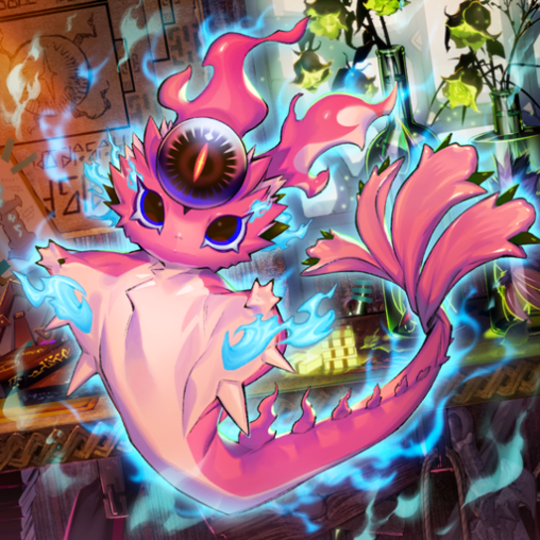
Snake-Eyes Poplar
#Snake Eyes Poplar#yugioh#ygo#Snake Eyes#The little guy that's about to warp the meta#Pyro#FIRE#yugioh tcg#ygo tcg
256 notes
·
View notes
Note
I'm sorry but WHAT is happening in Duel Links??
*CRACKS KNUCKLES* ALRIGHT im certain other people could explain this better than I could (bark at me if any of this is wrong,) but, an attempt at a quick rough tl;dr of it:
so like. an important thing to note with DL is that like..... the in-universe explanation for Duel Links is that it's one of Seto Kaiba's new VR Next Evolution of Dueling Ego Projects, which like, ok sure, he Makes Those, but what's a little alarming with this one is that technically (almost) none of the characters In The Game are actually Those Characters Specifically, they're AI recreations of them with their original self's memories (that's already a lot, right out the gate.) (I say "almost" everyone because I think it's implied DSOD Kaiba and maybe Mokuba actually Are them because it's Their Game and they're always product testing it, there might be others though)
anyway another thing with this situation is that, uh, Most Characters in Duel Links Do Not Know They're AI. They just assume they're the original guy, that's just them! Hanging out in this cool new Duel VR! But then sometimes you DO get characters who actively are aware that they're just code in a video game (Yami Bakura and Bruno 5D's both comment on it), so you have this really interesting ecosystem of duelists who Are aware they don't really exist, and duelists who are None the Wiser. absolutely batshit.
and sure this is all well and fine with like, DM and maybe GX characters, ok sure it makes sense Kaiba would be recreating notable duelists of that era, but i cannot stress enough He Is Also Making AI Recreations of Dead People. DL very much takes place post-manga, post-DSOD. But Yami Yugi is There. Yami Bakura and Yami Marik are Very There. Manga Pegasus is there. Seto "I Will Never Learn to Come to Terms With Grief" Kaiba is actively raising the dead in his little VR card game simulator so they can live forever and there's a 50/50 chance they'll be FULLY AWARE that they died. JESUS.
There's also the hulking elephant in the room of Duel Links Has Been Including Characters From Series Kaiba Has Nothing to Do With For Quite Some Time Now--and a lot of those characters are like HEY. WHERE THE FUCK ARE WE. like I SWEAR someone from either Zexal or Arv-V was actively like "hi what the hell is KaibaCorp" so like...Kaiba's branding is ALL OVER THE VR WORLD EVEN IN THE WORLDS HE DIDNT EXIST IN. It's painting this absolute off the rails picture of Seto Kaiba trying to create this virtual multiverse of The Best Duelists From Every Timeline Living or Dead, and half the guys he's pulling in at this point are like *spawns into a perfect recreation of their hometown with no real idea of who did this* "what in the goddamn."
like guys from zexal/arc-v are actively IN GAME like trying to figure out why this VR world exists and who created it. It's absolutely wild and fascinating to watch. excited to see what happens when they add VRAINS world next month?!?!? idk anything about VRAINS really but it's probably going to make the DL lore even more bananas.
ANYWAY. ALL OF THAT SAID. NOW WE HAVE MAXIMILLION PEGASUS DROPPING IN-GAME OMINOUS SENTIMENTS it's kind of a culmination of all of the aforementioned shit. Duel Links Pegasus (an AI recreation of manga!Pegasus, who is fully aware A.) that's he's dead and B.) that there's multiple worlds and timelines crammed into this Virtual Reality) has a conversation with Paradox (an AI recreation of Paradox the Bonds Beyond Time Yugioh Movie Bad Guy, who, for all intents and purposes, fully believes he's the real dude and he wants to kill-die-explode-murder Pegasus SO BAD) breaking down that "hey, this place unites different histories, and if you kill me duel monsters won't cease to exist. Anyway, I'm not real! Ohoho! This world holds threads of tragedy, Paradox-boy!" <-- (not verbatim. but i wish it was.) Meanwhile Paradox is having a sputtering breakdown right next to him. This is a video game to play yugioh the trading card game.
like. it's just absolutely wild. konami could have just said "hey heres yugioh characters from every series. whatever" but no instead they threw in a bunch of mild psychological horror and inter-series friction and existentialism and it's a freemium video game that i have 600+ hours on on steam. yugioh duel links !
#ygo posting#wow! that was not quick or a tl;dr at all! SORRY DFGHDGF#i guess the real tl;dr is ''seto kaiba is mentally unwell and now he's making it Every Yugioh Character's Problem." lmao#honey-bunnysaurus#asks#anyway i wish someone would make a DL lore video essay so bad...really the only DL video content out there right now#is strictly about the meta of the card game (which dont get me wrong is also fascinating in its own right)#but i wanna see someone talk about the absolute insane lore that is happened directly outside of the actual card game!!!#i wanna be vindicated that im not the only person noticing this!!!!#duel links
1K notes
·
View notes
Text
Yesterday after I reread this pretty well-known research about the origins of a name that people associated with Yami Bakura in the early years of the fandom (Akefia), I ended up going down a little rabbit hole of my own after the creators of names that are associated with Yami Marik in fanfics, and surprisingly enough I actually seem to have found their origins!
One that I still see in fanfics nowadays is Kek, so it was the main one I wanted to find, so I started out searching about Kek and Yugioh on both Tumblr and Fanfiction.net and ended up in this post asking the same thing, with a comment saying they heard a fic called Creepy Hide and Seek was the origin of the name. I found it and saw that in chapter 3 of the fic they do use the name Kek, and even give an explanation of why the name (“It was one of the old gods, before Ra”)... But searching the name on the same site I found usage of it from 2013, before the release of this story (sep. 4, 2014- dec. 5 2014), so yeah, it isn't the first.
Thankfully, I found way better leads soon: the fanfics Swagger Dagger and Grey Days (both from 2013) credited someone named Miss Macabre Grey for the name Kek, so I went after their YGO fics and sure enough, found Problem Position, which is the oldest usage of the name Kek so far (Dec 8, 2012) and an explanation for where the name apparently came from in the notes:
“Kek is obviously Yami Marik. I like it because it still has that “Ek” sound like in “Mar’EK’,” and it means God of Darkness. Plus, if you look at some “common personality traits” of people with the name, there are some that suit Yami Marik a fair bit. Even has an evil laugh ring to it. Like, “‘Kek, kek, kek, kek!” the old wizard wheezed before finishing his brew of poison.”
So yeah, that seems to be the end to this mystery so far. As a little bonus, I decided to go after another name for him, Amir, but that apparently has a pretty easy to find source: Fanfiction.net user VanillaKokain says they created the name on a askblog on Tumblr, and it seems to be this long deleted one called @Ask-ryou-the-medium, Also this by the same person, so yeah, the origin has also been found.
36 notes
·
View notes
Text
A Trapezoid of Foils: Judai/Yubel and Amon/Echo

I'm back on my bullshit, and my bullshit is yelling about the trashfire that is Judai Yuki and Yubel. This post is a collection of thoughts on how Amon and Echo were clearly meant to reflect Judai and Yubel in some way or other, and how it feels like it should be neater than it is. The parallels are there, but it's not fully symmetrical and some of the angles are kind of weird...so yeah, kind of like a (non-isosceles) trapezoid!
(Geometry Tumblr do not @ me, I'm doing my best with this metaphor)
Spoilers for GX season 3, naturally. I haven't said it before, but for this post as well as previous ones I'm basing all information and characterization on the sub version of GX rather than the dub (which drastically changes Yubel's backstory and motives).
Yubel and Amon
This is the most obvious one, because Yubel spends two whole episodes and honestly some of their most iconic monologues trying to tear Amon down after building him up the whole season.

They're both antagonists willing to cause harm to the one they love for their goals. For Amon, that goal is the power to build a utopia. For Yubel, the harm is the goal - or at least, the metric by which they will have achieved their goal (showing their love for Judai).
Yubel, of course, claims that Amon is more selfish in his use of harm. Pain is love in their philosophy, but it's mutual pain - dishing out the pain without taking any back would only be mere cruelty. This of course misses the nuance that Echo wanted Amon to use her as a sacrifice, while Judai didn't welcome any of Yubel's twisted affections.
Still, from what I've seen most people agree that Yubel comes across as more "honest" one way or another. And to understand why things feel that way, it's important to look at their backstory and motivations, as well as how their motivations change.
Yubel dedicated themself to Judai's past life, tying themself to him through lifetimes, and in the present remained true to that devotion in unwanted ways. When Judai sent them to space and it ended up being Oops! All Torture, Yubel developed their sadomasochistic philosophy as a coping mechanism and an attempt to reconcile Judai's past promises and present actions.
Upon their return to Earth, they planned to return the "favor": by sending Yubel to the pain and isolation of outer space Judai made them stronger (i.e., infected by the Light of Destruction, with all that entails), so they'll give him his own painful experience (all of season 3) to make him stronger (awaken his power as Supreme King). Then they'll reunite, having both demonstrated their love for each other, and [this part is where the Light of Destruction really twists up their thinking]. Everything they do is in the name of this motive*, whether Judai really likes it or not.
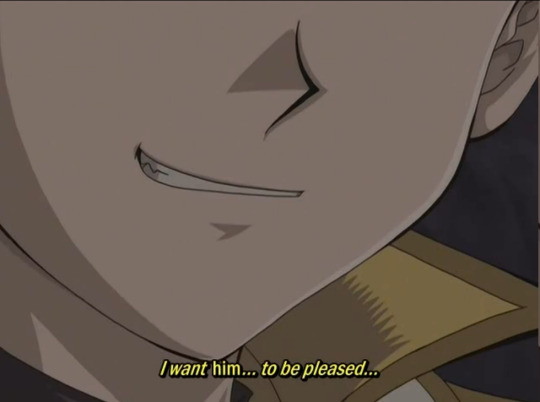
Amon dedicated himself to the Garam conglomerate with Echo by his side before being replaced by his younger brother Sid, the sole blood Garam sibling. He nearly murdered Sid before changing his mind and dedicating himself wholly to his brother instead, a decision Echo and Yubel both describe as willingly chaining himself to their service. Even when given an opportunity to become the heir (all it'd take is watching his brother die to illness, not even murder) he rejects it, and begs for a way to save him.

And yet, when when given the opportunity he made a deal with the devil to break the chains he put on himself and abandon that same family. Then when he gets the chance to obtain power by sacrificing someone he loves, he does exactly that. Then he plans to become king of a utopia free of suffering, and always remember Echo.
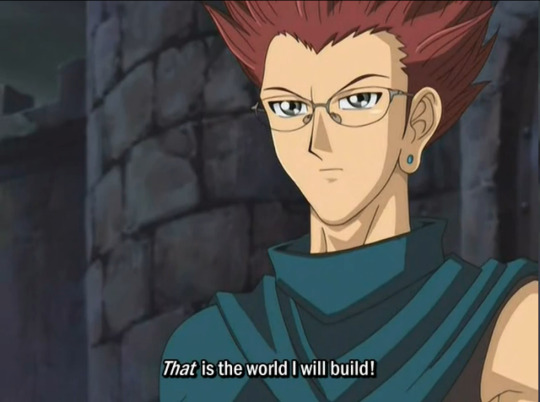
So then, what are Amon's motives? Is he somebody who got tired of being abandoned or unappreciated? An ends-justify-the-means idealist? Just a power-hungry hypocrite? It's hard to tease out a consistent character and ideology from him. And in a show where people wear their hearts in their decks, I think this part of why people hate him - and so does Yubel.
Yubel hates Johan because he's terrifyingly like Yubel in some ways, focused and protective and dear to Judai.** Yubel hates Amon because he can't be like Yubel at all, resenting the brother he dedicated himself to and sacrificing the person he loved for power in an empty world forever devoid of that same person.

No way Yubel can be that kind of person, right? Otherwise, what was it all for?
* To be fair, you don't know all of Yubel's backstory by the time of their final duel with Amon. However, even removing the context of their past life that duel together with Yubel!Johan vs. Hell Kaiser establishes Yubel's central motivations more coherently than they do Amon's.
** Help, I know there's been other essay segments on this topic, text and video alike. But I saw a lot of them back in early 2023 when I was mindlessly going through GX material in a haze of hyperfixation and now I've forgotten all the other good sources.
Yubel and Echo
If Yubel's parallels with Amon are about their dedication, Yubel's parallels with Echo are about who they're dedicated to. Both believe in their loved one's destiny to become a king, and take actions to make them that king.
Yubel has historical basis in that Judai is quite literally the Supreme King, bearer of the gentle darkness. To help him achieve that role, Yubel enacts a plot to break Judai until he awakens his Supreme King side. It fits neatly into their schema of things: this is how they make the person they love stronger, so that they will thrive and survive. Make Judai stronger and awaken his old power, and all will be as it was meant to be.
Echo just believes that Amon is amazing enough that he would make a better king than anyone. When the chances arises to help break his chains and give him a world to rule, Echo takes it.
...And boy does she.

Both Yubel and Echo believe their loved ones are meant to be a king. Both give their lives in support of their loved one, and become weapons wielded in their service.
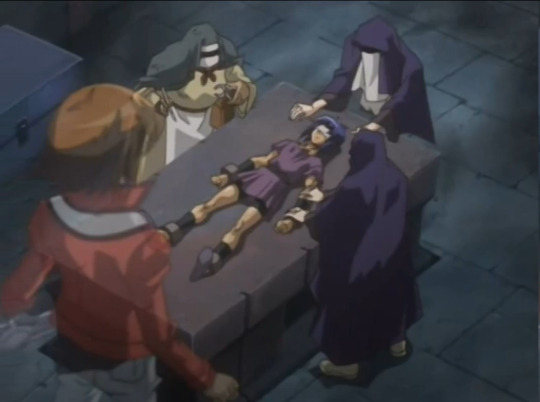
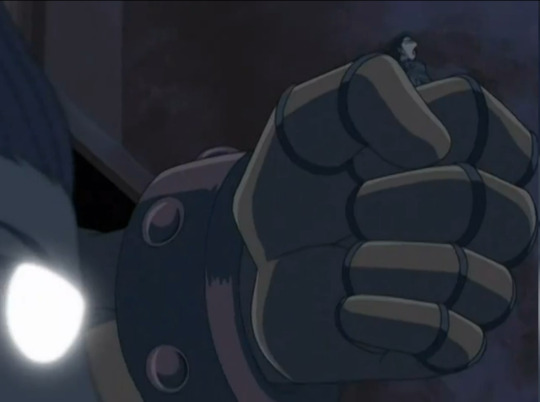
No wonder Yubel was shaken by Echo's devotion remaining within Exodia for just a moment - it's not all that far from their own.

Unfortunately Yubel's only direct interaction with Echo is goading her attack on field-Yubel during the final Amon duel. Otherwise they only speak of Echo as someone used and abandoned by Amon - which in itself has potential, given Yubel's own feelings about Judai sending them away.
I think GX could definitely have explored this connection a bit more. There's space to fill here.
Judai and Amon
As noted above, Judai and Amon both have roles as kings - at least, in the eyes of their single most loyal people. Judai holds the title of Supreme King as the wielder of gentle darkness, and while not confirmed his past life sure looked like a prince. Amon simply has ambition, talent, and an ideal world in his mind.
And in operating with the ambition of kings, they both do terrible things to achieve power. Judai lays this out explicitly in the Edo vs. Amon duel:
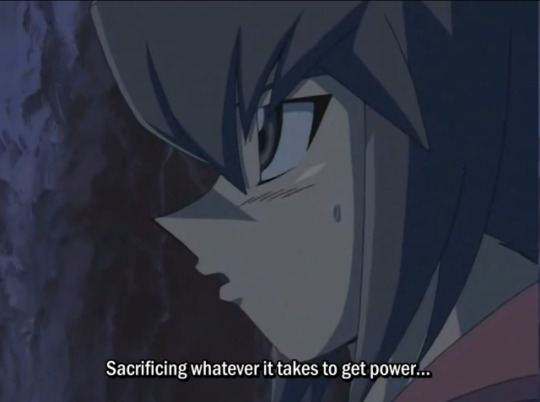

Amon lets his need for power get in the way of his other relationships and priorities, and sacrifices the ones he loves to obtain Exodia similarly to how Judai sacrificed his friends and eventually uncountable innocents for his own goals - finding Johan, and then ruling as Supreme King. Straightforward, right?
But I think there's another parallel between the two that's a lot more interesting. Or...most of a parallel. Namely, their relationship with their other halves and the responsibility of a loyal follower who would give up anything for you, be it their life or their humanity.
What do you do when the person you love most dedicates their existence to you - to the point of throwing everything else away, even their very life?
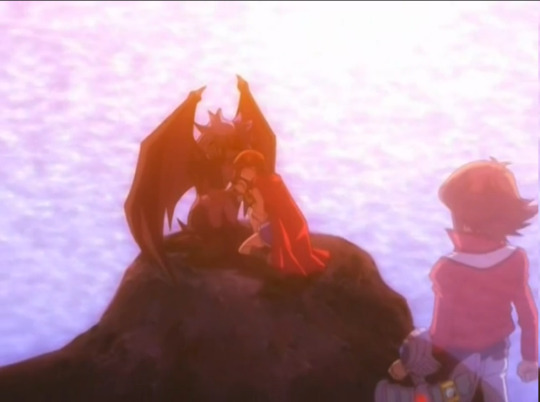
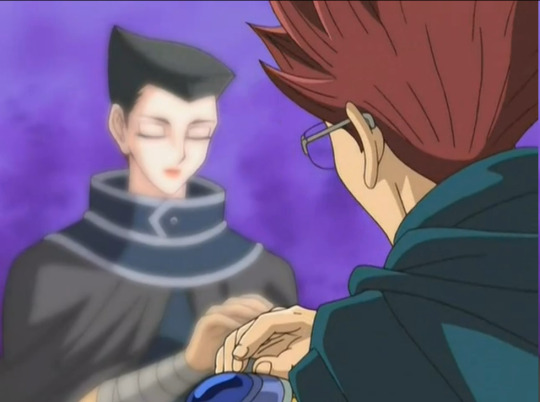
Of course, the Judai-Yubel and Amon-Echo situations aren't exactly the same even putting aside the issue of reincarnation. (For the purposes of this essay I'm not making huge distinctions between Judai and his past life, but if you want to get into the details I've written about that previously.)
Yubel went ahead and made their sacrifice without Judai's input, and all he could do was decide how to respond. He chose to dedicate himself back to them so hard it crossed lifetimes, so hard he chose to risk his own existence for them as well in his next life.
Amon, on the other hand, is the one who proposed Echo sacrifice herself for him. Echo agreed to it, and even by the end she stood by her decision. But Amon loaded the gun and pulled the trigger.

He tries to honor her sacrifice, of course. He's always mindful of Echo's sacrifice and what it means. But in the end, he did choose to sacrifice her, ultimately using her as a pawn. Their love never trumped his own objectives.

And I think the example of Amon and Echo leads to the question: if Judai had the choice of letting Yubel become a dragon or stopping them, what would he do? When it was explicitly their will?
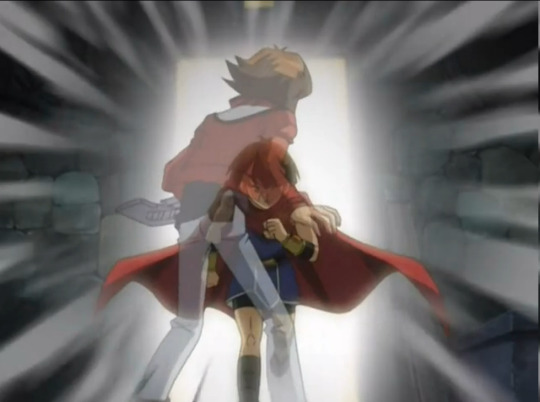
This is another missed opportunity, one that could have solidified the parallels neatly. But GX never asks that question, so the answer is unclear. What could have been a parallel is just kind of...askew.
Judai and Echo
Okay, I admit there isn't a lot here off the top of my head. Probably the best parallels between them are in relation to their other halves, as the people "harmed" by their villainous partners, and how they respond to that harm.
Judai rejects Yubel's torments as unwanted attention, until he remembers the past and flips to understanding why Yubel did they did and makes moves to unite the two of them forever. Echo, meanwhile, understands Amon's motives from start to end and...lets herself be sacrificed, the end.
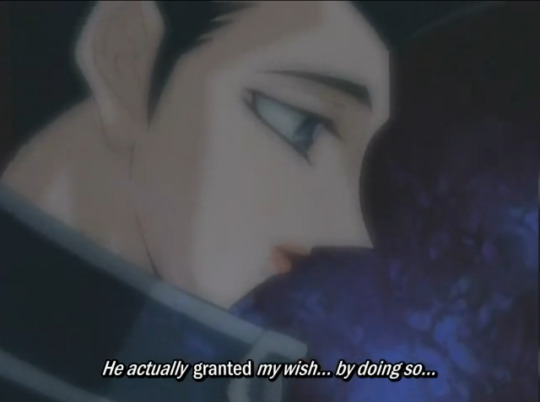
I don't know about this one. Really, ultimately Echo is supposed to be a willing participant in her own sacrifice but in the end I still don't feel like the narrative gave her a strong sense of agency in the matter and it really weakens my attempt to write this section.
In Conclusion
Some of these connections are stronger than others for sure, but I argue that they're all there in some way or another. They're very uneven and overall I'm not entirely sure what you're meant to take from the parallels, and I wish I could give something neat and concise for this section. Instead, it's a bit messy and misshapen - hence, the trapezoid metaphor.
Still, I think there's interesting room for thought in this awkward space. I was certainly thinking about these parallels while working on the latest chapter of Need (accidental last-minute plug?) and trying to figure out exactly what the prince felt while Yubel was in the middle of dragon surgery. What must it be like, to be in these relationships of sacrificial devotion?
#yugioh gx#yugioh series#judai yuki#yubel#amon garam#echo#essaying#meta#analysis#once again thanks to kaiowut99/GymLeaderLance99 for the subs#they're being used for a good cause?#anyway here's the product of me thinking too much about yu gi oh gx season 3#and all things yubel related#i am so on my bullshit
43 notes
·
View notes
Text
What the hell happened with Crow: an autopsy (Part 2)
Hope you didn't think I'd forgotten about this post yet. Lads, ladies, and other lovely people, here we go. I have more yelling about bird boy to do.
But first, a few disclaimers. For people who may have missed part one, yes, as the title implies, this post is part two of an attempt to analyse Crow's character throughout 5Ds' whole run. You can find part one here. Now, both for people who may not have the time/energy to read my first, huge post about this right now, let me explain what I'm about here before we start again: My analysis is not meant to deter people who like Crow from liking him. It's also not meant to convince Crow haters otherwise, even if I admittedly personally like Crow. All of this stuff is just my personal attempt at dissecting how his character was handled in the show and why that might have been. And because this is part two, and I covered the Fortune Cup and Dark Signers arc in the first post, I'll start with the pre-WRGP arc, then dig into the backstory Crow was given directly before the WRGP begins properly. Also, mind the length of this post. I'm physically incapable of writing short things.
I also feel the need to reiterate another thing before I really get into the meat of things again: If you were hoping to see any old rumours about 5Ds confirmed, this is the wrong post. In fact, thanks to the very thorough work of someone over on Reddit (another shoutout to @mbg159 here, who's the author of those posts), I know for a fact that literally all the big rumours surrounding Crow are one big pile of logistically impossible horseshit, and I think after so, so many years of people citing this nonsense, the fandom as a whole finally deserves to let these go:
No, Crow was not meant to be a dark signer, least of all the final boss of season one, and Blackwings were not the reason he got more screentime later.
No, Aki being sidelined was not the result of her irl voice actress' pregnancy.
Yes, I know these two posts are both a long read each, but I cannot begin to tell you how tired I am of these rumours. So even if you don't have time to read the stuff above, please take away this: The big 5Ds production conspiracy theories are. all. bullshit. Because, to put it in as simple terms as possible, none of them work out logistically. The events people have pretended affected the show's production in a major way all don't line up with the actual production timeline. So just can the rumours already. Please let them die. And no pitting Aki and Crow against each other on his post or because of this post, yes? I beg you, I am so tired. Ok? Ok.
All right, now we can get to the good part. In my previous post, I left off at the end of the DS arc. So, in what position is Crow at the end of the DS arc? He helped save the world by defeating Goodwin and got his very own signer mark after Rudger/Roman Goodwin's death.
And now, where is Crow at the start of the pre-WRGP arc?
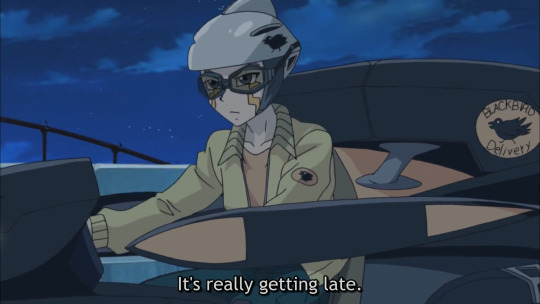
(Bam. Delivery bird boy be upon ye.)
This time, Crow wastes absolutely no time coming back on screen. We see him again within the first episode of the second half of the show, and wouldn't you know it! He moved in with Yusei and Jack and the three of them have a funny, brotherly, bickering dynamic between them. Also, as a fun little add-on that is very much in line with his deeply Satellite, down to earth characterisation from the first half, Crow now works as a delivery driver to earn money for the household. That's all very nice and good.
But what is his role in the plot from here on out? Well.
First, a small note about the pre-WRGP arc. Though this arc is fun to watch because it gives us a lot of silly character interactions the show no longer found the time for once the WRGP started, the pre-WRGP arc really can't be said to bother with actual plot much. It's the known filler arc of 5Ds, and as such, Crow is not the only character who gets pretty much nothing plot-related to do during this arc. Thus, I'll only give a quick run-down of what he does get up to, just in case any of these tidbits end up showcasing a relevant aspect of Crow's character I might come back to later.
Furthermore, another thing that's pretty much obvious to everyone who's ever watched the show in its entirety but still bears mentioning: Crow gets a lot more screentime from this point on out. Technically. Why do I say "technically"? I'll get back to that further below. For now, just keep it in mind.
So, how does Bird Boy spend his time during the arc where the plot's on the back burner? To be honest, on the sidelines, mostly. Don't get me wrong, Crow's there. Most of the time. But he gets pretty much only two episodes where he's the focus, and both of those aren't exactly known for being 5Ds' most memorable episodes (even though I still like them both tbh, but I digress): For one, in episode 68, he gets to convince Bashford to move in with Martha so the depressed old man isn't spending his entire retirement living in a scrapyard.

(This episode's comedic moments are actually fairly solid. But those are just my two cents.)
And for two, in episode 85, Crow gets to bond with the boys' somewhat cranky landlady, Zora, by duelling some sense into her son, Lyndon. (Which also introduces us to a duelling tactic only Crow uses that we will later see again: Losing on purpose.)
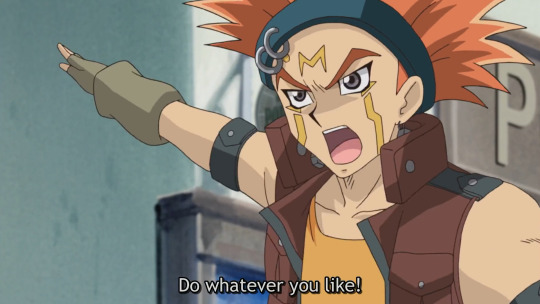
(And here we can see Crow showing off his skills at dealing with petulant children.)
Now, do these two episodes where he gets to be relevant actually do anything for Crow? As a character? Debatable. If nothing else, they strongly reaffirm the values Crow represents which we were introduced to in the first half of the show, though. They reintroduce us to his stubbornness, to his (in comparison to Jack and Yusei) more playful nature, to his very Yusei-ish dedication to doing the right thing, to his penchant for spite, and to his strong sense of family and community and his belief that these two things shouldn't be abandoned unless you have a damned good reason for it.
You may notice that there's a sizeable gap between these two episodes. That's because those episodes are where we get the only smidgens of plot in this arc. Among them, highlights like Sherry's introduction, the first reveal of accel synchro, Aki's turbo duelling license exam, three separate story beats hinting at the machinations of the emperors of Iliaster (Luciano's little stunt with Rua and Ruka, Placido getting started on building a killer robot army, and the Jack double being unleashed onto NDC), and Bruno's introduction. So, here's the thing: Crow is technically present during most of those episodes, too, but he doesn't actually get to meaningfully interact with the plot-relevant elements. (Which is not to say he doesn't have nice moments here and there. He does get to bounce off the other characters, and, just as one example, helps Yusei and Jack upgrade Aki's duel runner, as well as help Yusei build Rua's duel board. Crucially, he doesn't get to do anything that later becomes plot-relevant, though.) Moreover, not one, but two characters who end up becoming major players in the series' finale are introduced here, which is relevant insofar as that Bruno and Sherry both end up needing a good amount of development before they can impactfully take their later roles. Now, I say this with nothing but genuine appreciation for both these characters, because I do like them, but I feel the need to point out what this means not just for Crow, but for pretty much everyone who isn't Jack or Yusei: Every minute of screentime that was dedicated to Bruno and/or Sherry was one minute less the writers could spend on the rest of the cast. This is not to say that time shouldn't have been spent on them, they needed it, especially because they were introduced so late, but it's something I do want people to keep in mind when talking about who got how much screentime and whether or not that time was well spent. (I also have a larger gripe with the definition of "screentime" in general, but more on that later.)
So when does Crow get to be relevant to the plot again, now that he's even a signer and all? Well, not until episode 94, when the WRGP arc has already started. (Note that I'm using the 5Ds episode list on wikipedia as a general guide for which arc and which season starts where. You can find it here.)
*Deep breath*
So. Episode 94.
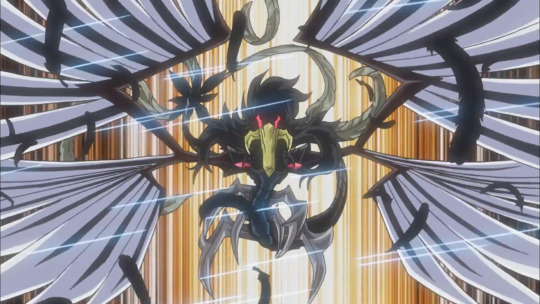
(Pictured: One very scruffy dragon. Bird? Dragon-bird. Bird-dragon. You figure this shit out.)
That episode. The episode where Crow, who was awarded with the status of a signer during the finale of the DS arc, finally gets a dragon to match his mark. And the episode where we finally, finally, get some actual backstory for Crow that goes beyond his involvement with the Enforcers and childhood with Jack and Yusei. A backstory that's only Crow's own. Except. How do I put this politely...
This shit doesn't make a lick of sense. Neither the events in the duel between Crow and Bolger in the present resulting in Black-Winged Dragon's appearance, nor the Pearson backstory.
Now, I'm not saying this to step on anyone's toes. From a writing standpoint, I can even make a fairly reasonable guess as to why this episode/mini-arc is here, I think: As I mentioned in part one of this analysis, Crow was not only introduced very late, but also got very little backstory of his own, which set him apart from the other signers. Don't get me wrong, he did get some backstory—we know of his strong connection to Duel Monsters because he learned to read from cards, and we know of his involvement with the Enforcers/Team Satisfaction. Crucially, though, Crow doesn't really get a backstory segment that feels as unique to him as the others. Aki gets her tragic past with her parents and her powers, Jack gets his betrayal of Yusei, which also doubles as part of Yusei's backstory, who as the protagonist understandably gets the most backstory, and even the twins, though they are as always treated as one unit, get their very own segment about the time when Ruka was essentially in a coma. Meanwhile, Crow only has that one-off tear-jerker moment about learning to read from his cards and his being a part of the boys' duel gang, which, and I cannot stress this enough, is treated as more of a Yusei and Kalin/Kiryu backstory by canon than a Crow backstory. Thus, it makes perfect sense from a writing standpoint that the Pearson/Black-Winged Dragon mini-arc would be here. Crow, up until this point, has neither a backstory segment dedicated solely to him, nor a signer dragon to call his own. So, how do we solve this? Give him both in a strategic double-whammy! The math checks out. Unfortunately, the writing of said mini-arc... doesn't.
Now, look. The juicy question of whether Crow would have worked better as a non-signer or not, which I already discussed in part one aside, I personally don't hate what this backstory is trying to do. It's just that the whole Pearson-drama has some very notable, logical holes which I'll get into below. Furthermore, this is not the first time something related to Crow has some unfortunate, logical and/or chronological issues. I already brought up the infamous fridge and Rex Goodwin's rather confusing backstory in part one, both of which raise some serious questions. However, Pearson and everything surrounding him arguably blow that clean out of the water. Let's examine this more closely, shall we.
The long-overdue backstory we get for Crow begins with a mystery: Mikage and Trudge, for a reason that is never given to us, are investigating the death of Robert Pearson (whose death would have been several years ago at this point), whom Crow knew very well, and they're doing it because they found a hint that the person who killed Pearson used an illegal card, Crimson Mefist, to do it.
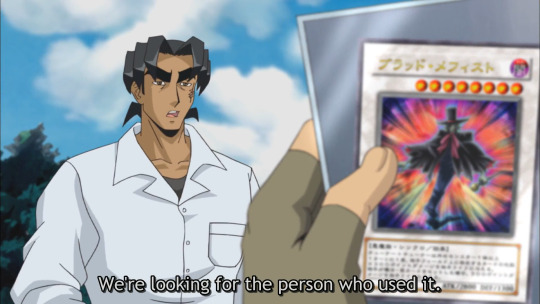
(Post redemption-arc Trudge actually doing his job instead of bullying random Satellite citizens. Who would have thunk.)
Thing is, here, we already encounter our first, minor problem: Pearson has never been mentioned up until this point, not even as an aside. And this issue is compounded by the fact that not only Crow seems to know him, but Trudge claims to as well, because "Satellite used to be his jurisdiction". So, a named character who's familiar to both one of our protagonists and a notable side character, and we've never seen hide nor hair of him. If we pull our heads out of the story for a second, the irl reason for how this came to be is probably pretty obvious: Pearson was never mentioned before because the writers had nowhere near as solid of a plan for Crow as they did for the other characters, which leads to him being introduced out of nowhere here because we need a backstory and a dragon for Crow and we need those now. Moving on.
The mention of Pearson having been not simply killed in a fire, like Crow previously assumed, but having been murdered through a special, illegal card immediately makes him suspicious. So, he goes to consult Bolger/Bolton, another never-before-seen character who gets introduced in service of this backstory, and who knew Pearson well. And while this guy certainly acts amiable towards Crow at first, implying that the two have a good rapport, at least, he quickly starts acting suspicious when Pearson's murder comes up. Moreover, we as the audience at this point already know Bolger's looking for Black-Winged Dragon so he can use the card essentially as collateral to save his company. And the name "Black-Winged Dragon" already leaves very little to the imagination as to whose deck this monster is supposed to fit into. But, in a small twist, we learn from Crow that this was apparently Pearson's card, and supposedly lost in the fire where said man died, to boot. Then Bolger challenges Crow to a duel, too, offering to tell the truth about Pearson's death if he loses, but demanding Black-Winged Dragon, which he believes Crow to be in possession of, if he wins. So far, so good. We've got a mystery here, and canon is not contradicting itself just yet. Until we get to the actual backstory, which shows us the time Crow spent with Pearson, that is. Before we get into that, I'd like to highlight one theme this mini-arc introduces that actually feels like it fits Crow: Legacy. Over the course of meeting Bolger again and being reminded of his time with Pearson, Crow starts thinking about whether he's taking over his former mentor's/father figure's legacy well enough.
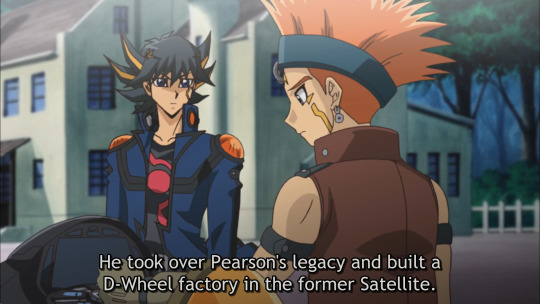
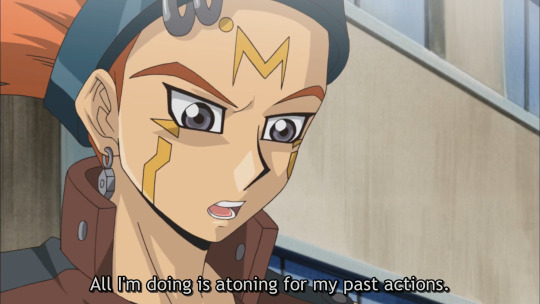


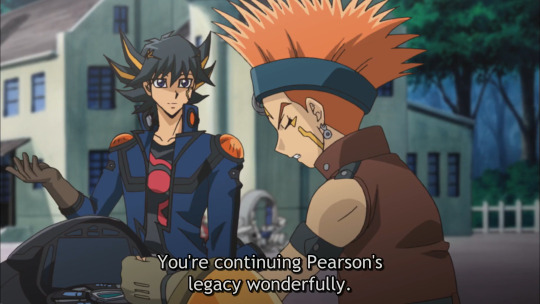
(Crow having some Deep Thoughts TM, featuring one of Yusei's most relaxed, easygoing smiles in the entire show, probably.)
This theme, I would argue, is one of the major things this backstory introduces that really meshes well with the Crow we already had until this point. He's a community-focussed guy and absolutely a family person, if him taking care of Satellite orphans is anything to go by, so leaving behind a good legacy for the people after him (read: the kids he took care of) would absolutely be something he cares about. We see this element of legacy again in his cards during this episode, too, which canon implies he inherited from Pearson. (I'll get to THAT can of worms below.) And on paper, with the themes he's already got going, Crow being the only one to inherit his deck rather than build it all by himself would actually make sense!
However. This is where we have to get into the meat of the backstory. I'll start by listing the barebones information Crow's backstory with Pearson gives us, then going into why several aspects of it are either logistical or chronological nonsense.
So, as canon tells us, Crow met Pearson after Kiryu/Kalin was arrested, when the Enforcers/Team Satisfaction all went their separate ways. During this period, Crow had already set up shop near the original Daedalus Bridge and started out taking care of orphans, but it wasn't all smooth sailing. He was, by his own admission, "living aimlessly". Then, during a pinch, Pearson and Bolger show up, take care of some bad guys for Crow and the kids, and Crow sees a new role model in Pearson. Pearson, who rides the Blackbird, plays a Blackwing deck and owns Black-Winged Dragon. So, he joins up with Pearson, presumably learns how to work on duel runners from him, and also befriends Bolger. Then, one day, a fire breaks out at Pearson's workshop and the man in question dies, but leaves Crow his runner and his duel disk before he does so. End flashback. Because I want to tie this together nicely, we also learn later that Pearson technically left him Black-Winged Dragon, too, by sealing it in his runner. And, of course, that dragon later becomes Crow's very own signer dragon.
Several points to be dissected here. And funnily enough, Bolger's duel with Crow isn't relevant for any of them. Let's start with the big one: The timeline. I want you to remember that as far as canon is concerned, Crow is 17 during the DS arc. Moreover, it's canonically stated that Jack stole Yusei's first duel runner two years before the show's start, at which time Crow would have been 15. And their time together as the Enforcers must have been even before that, because Kiryu/Kalin was already in prison for a while at that point and Crow and Yusei don't reunite until the DS arc is basically in full swing. So, I'll make a vague estimate here and say that during the time of the Enforcers, Crow would have probably been 13-14. (Which is hilarious when you think about the fact that this gang of angry teenagers essentially took over the entire duelling underground of Satellite, but I digress.) Now we add the idea that Crow met Pearson after the Enforcers, but that he died before canon starts into the mix. That means Crow first ran into Pearson sometime around age 15, and that he then died presumably before Crow turned 17. So far, so good, that still slots into canon, even if it makes Crow pretty damn young for some things. He's even missing the personalised Blackbird duel disk he later wears during the Enforcer days, I went back to check. What he is not missing, however, are his Blackwings. And this is where canon may or may not have made an implication that, if intentional, breaks this timeline. See, during the scene where Pearson's workshop is burning down and he's already trapped under debris and has embraced death, he tosses Crow his duel disk and leaves him his runner.
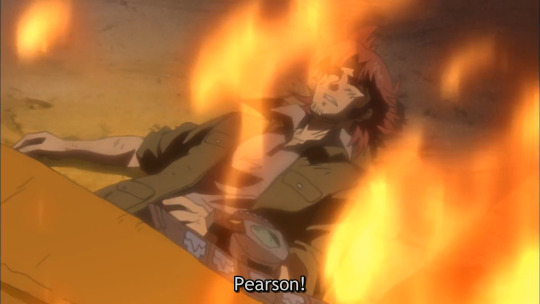
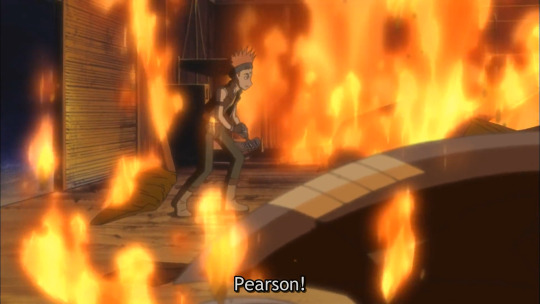
(Two important screenshots, in sequence. One, Pearson with his duel disk still strapped to his arm. His deck is very obviously still in there. Two, Crow with that same duel disk, as made obvious by its distinct shape.)
What this implies is that Pearson also left Crow his deck. Which, yeah, fair enough, if I were dying in a fire I'd probably also think "fuck it, not like I'll need my cards in the afterlife". What this (and Crow's look the first time he sees Pearson's monsters) implies, though, is that Crow didn't start playing Blackwings until Pearson left him his deck. Which is factually untrue, because there is literal evidence in the show that Crow already had Blackwings during his time as part of the duel gang, before ever meeting Pearson. (The exact episode, if you want to check for yourself, is 33, where Crow summons both Bora the Spear and Blackwing Armor Master during a flashback.) However, I will concede that the show never actually states this is the case, it's just implied by what we see on screen, so perhaps the idea here was that Crow already played Blackwings before Pearson, but grew to love them even more through his mentor/father figure, and so later happily integrated the deck he inherited into his own. Crucially, canon never states this outright, either, though, so the option remains on the table. But, to give the benefit of the doubt here, the possibility that this could still slot in with canon and that it was just handled poorly is there. The same cannot be said for the Blackbird, however.
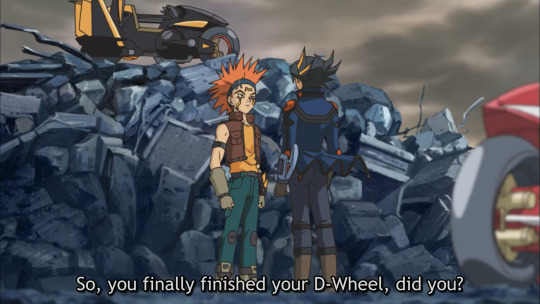

(Uh oh. So much for canon continuity.)
The above two screenshots directly contradict each other. First we have Yusei, upon reuniting with Crow in Satellite during the DS arc, casually remarking that Crow finished his duel runner. Which means that canon at this point suggests to the audience that one, Crow built this duel runner by himself, for himself, and two, that Yusei knew about it for a while already. Then there's the second screenshot, from the Pearson backstory episode, where Crow outright claims the Blackbird was left to him when Pearson died. I don't think I need to tell anyone that these two things can't be true at the same time. And again, I think this is where Crow fell victim to the writers not having a clear outline for him. At first, he was supposed to be this scrappy guy who also built a duel runner for himself, just like Yusei. But now, he's a signer, needs a backstory and a dragon, and because a theme of legacy is introduced alongside Pearson, the runner suddenly needs to be inherited, as well as (possibly) Crow's cards. Now, a crafty fanfic writer could probably reconcile the above contradiction somehow, and I know some stories that accomplished that. But the point isn't that we, as the audience/fandom could make this work, the point is that canon didn't make it work. What canon, sadly, also didn't get to work was Black-Winged Dragon.
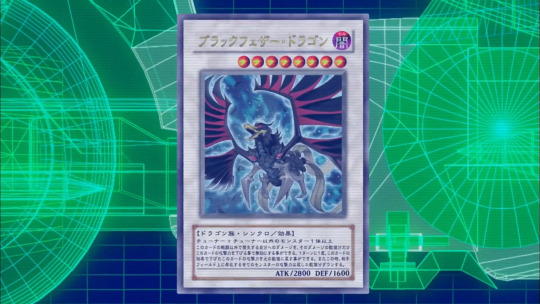
(We meet again, bird-dragon.)
Here comes the next elephant in the room: Everyone and their mother who has watched 5Ds knows that Black-Winged Dragon was never implied to be a signer dragon up until the duel where Crow acquires it. In fact, an entirely different dragon is teased so heavily long before BWD ever shows up that it to this day is one of many people's major gripes with the show's writing.
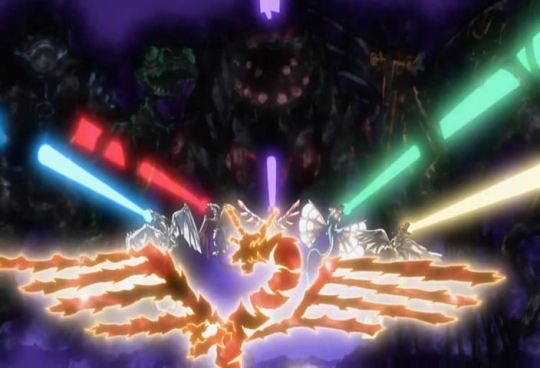
(Why, hello, Life Stream Dragon! Fancy seeing you here.)
And yet, Black-Winged Dragon is turned into a signer dragon before Life Stream Dragon, who was teased more than sixty (!!!) episodes before BWD was ever even mentioned. Why? Simple: Because Crow became a signer and Rua/Leo didn't, because the signers all need dragons (or else the "5Ds" part kind of doesn't work), and because Life Stream Dragon thematically doesn't fit Crow.
Now, I've seen people post theories to reconcile this weird hitch in canon, hell, I've even posted an idea for how it could be reconciled myself. But, again, that isn't the point here. The point is that as far as good old, barebones canon is concerned, it isn't reconciled. Canon at first states there are five signers, suggesting that there are also five dragons. But then, the fifth dragon never shows up, and one of the signers dies, to boot. Only for canon to then teach us, oh, no, look, the signer marks can wander from one person to the next. And to add insult to injury (at least where the show's writing and internal consistency is concerned), the signer mark that was "freed up" by Roman/Rudger's death doesn't wander to Rua/Leo, who any attentive watcher would have expected to become a signer because it was heavily teased during the DS arc, but to Crow. Frankly, I'm not surprised many people were angry about this, but in case my disclaimer didn't make it clear, I don't think it's productive to pin this on Crow by claiming his cards became super popular irl. There was definitely an out-of-left-field writing choice made here, but the only answers as to "why" were left in the 5Ds' writer's room, I believe. At a guess, if you want me to throw out a non-sugarcoated theory as to why, though? They probably thought Crow would be a more interesting character for their target audience. He's a scrappy guy who sticks it to authority, he's brave, he's funny, he plays a cool deck, and most of all, unlike Rua, he never embarrasses himself in a duel on screen. Why am I highlighting that last part? Because I feel like people sometimes forget that the target audience for this show, at the time of its creation, were about twelve year-old boys. And you can feel free to contradict me on this, but most twelve year-old boys I've known and know don't want to project themselves onto a chracter who loses and gets his butt kicked a lot, and who's a bit awkward and steps in it sometimes, which is much closer to how actual twelve year-olds are—but that's exactly why they prefer the cooler characters. And Crow is the cooler character, by average twelve year-old boy logic, regardless of what the grownups of this fandom think.
So Crow gets a dragon and the writing doesn't bother explaining the how or why of it, let alone tackles any of the implications made by Black-Winged Dragon's existence as a signer dragon. (Like what does this mean for the larger worldbuilding? Does the Crimson Dragon actually have more than five servants, but chooses to only ever bestow five marks at a time? Can any "dragon" the Crimson Dragon chooses be a signer dragon, and it just so happens that the constellation of signer dragons is nearly the same as the original one in present-time 5Ds canon? Did the Crimson Dragon specifically elevate BWD to a signer dragon because it felt like it? Was BWD always supposed to be a signer dragon? Was Pearson supposed to be a signer, but died too early before the dark signer prophecy was set into motion? Am I overthinking this? (Yes.)) He also obtains his dragon in what feels like the weirdest way possible to me, because it suddenly??? Just decides to appear in his runner????? Out of nowhere??????

(Why is that here. How did it get there. Why did Pearson even put it in there. And HOW. Is it just wedged between the machinery or what???? And how on earth did Yusei, Bruno, and/or Crow never find it before this point considering how often someone tinkered on the Blackbird on screen???)
(This scenario, of course, also raises the question how the other signers even got their dragons. But like many other, interesting questions, this episode chooses not to interact with that one whatsoever.)
In short, this backstory is a bit of a mess, to say the least. For as much good as it tries to do by contextualising Crow's character and giving him something that sets him apart from the rest of the protag group, it feels like a rough draft of an episode was given the green light to be produced without any editing, judging by the contradictions and weird implications. As such, it harms Crow's character as much as it builds it, as evidenced by how much fandom backlash he still receives years later for the things that were bungled in this backstory and also in different aspects of his character writing.
Now, you may notice this post has gotten stupidly long due to just how convoluted the specific hangups of Crow's backstory are. I originally meant to cover the WRGP and even the Ark Cradle arc for Crow in this post, too, but due to how much there was to say about canon's attempt to finally make Crow a "proper" signer, I've decided that trying to force another two whole arcs in here would be a disservice to the analysis and the character, and also make this agonisingly long, so I'll close this part out here and write a part three, perhaps even a part four depending on how much material the WRGP gives me to work with.
There's one more thing I need to get back to before I finish up this part, though: The "screentime" discussion. I mentioned far above that I take issue with how some people seem to be using the word screentime, and now I can explain why. First, I want you to take a look back at the episodes I covered here, those being 65-95, essentially. Now, as anyone who usually dislikes Crow will tell you, Crow is present in most, if not all of these episodes. He's on screen. He's getting screentime, and, according to many people, hogging it, even. Okay. Now, I want you to look back up at the analysis. How many episodes did I cover where Crow actually gets something to do? As in, where he's either the focus of the plot or gets to contribute to it in a significant way? There's the old man Bashford episode. There's the Poppo Time clock episode. There's his two backstory episodes. That's four. Four episodes. If you're generous, you might add in the episode where he gets to narrate Yusei's backstory alongside Jack and the two fake Jack episodes where he gets to have an emotional moment or two with his foster-brother. If you're less generous, you'll note that none of these episodes have Crow actually interacting with the main antagonists in a meaningful way or set up anything important that pays off later. (Hell, he doesn't even get any, and I really mean, any meaningful setup interactions with Sherry, who ends up being his final-boss-level opponent during the final episodes! Aki gets more meaningful interactions with Sherry than him, not that this ever gets a payoff.) And this is why I take an issue with people claiming Crow gets so much "screentime" post DS arc. Because to me, "screentime" should be time spent letting a character act meaningfully within the story, which most of the pre-WRGP episodes aren't for Crow. He's on screen, yes, but in many episodes, it wouldn't matter one whit whether you replaced him with a nameless side character, which isn't exactly a great look for a supposed third of a protagonist trifecta. Perhaps I'm being too strict with my definition of "screentime" here, fair enough! But the claim that Crow hogs screentime already rubs the wrong way during this comparably unimportant arc, so I can't leave it alone. It feels very decidedly malicious to claim a character who during some episodes seems to only be there to provide exposition or make whatever jokes Yusei and Jack's personalities aren't suited to is stealing screentime from other characters. As for the WRGP duels and whether he's "hogging" anyone's screentime there, I'll dig into that nonsense in the next part, please be patient with me.
...Phew. Okay.
Now, before I leave you to wonder whether I'm every finishing my Crow analysis in full again, I want to attempt to do the same thing I did in part one—propose some changes that could have been made to the writing for Crow's character in order to make things slot in better with the rest of canon. With a small disclaimer, of course: These are just my suggestions as to how Crow's character could have fit into canon more smoothly and been done less of a disservice by his own backstory.
So. First, a quick-fire thing about the pre-WRGP, to get that out of the way: Crow, alongside Aki, is the only signer who didn't get his own confrontation with either Iliaster or their minions. (Yusei had Ghost, Jack had fake Jack, Rua and Ruka had Luciano.) Instead of having him confront a cranky old man in a scrapyard or Zora's son, they could have easily given him a very short side-story where he gets to experience the threat of Iliaster up close and personal, too. Hell, they could have very nicely cut the recap episode where Crow and Jack lie in the mess of Jack's terribly built coffee table and philosophise about Yusei's backstory for this, too. (As funny as their interaction about the coffee table and Jack lying on the floor with a perfectly intact coffee cup are.)

(Pictured: Two idiots (affectionate) contemplating life among the scraps of a shitty, broken coffee table.)
Then, there's the Pearson backstory, of course. So, here's the thing, I think two very different kinds of "fixes" could have worked here. Crucially, they both depend on Crow's status as a signer. I argued in part one that Crow might have worked better as a character if he hadn't actually become a signer, so I'll give both versions here. Let's go.
Option A: We try not to touch canon too much and Crow stays a signer.
How to do this? Frankly, I think what Crow's mark and Black-Winged Dragon were majorly missing was setup. The mark is the smaller offence here, since, fair enough, the idea that signer marks can wander from person to person isn't too out there for 5Ds canon. However, the lack of a dragon despite the alleged 5Ds stands out, and Life Stream Dragon's wasted setup only makes it worse. Thus, making Black-Winged Dragon make sense would have required giving him the same amount of foreshadowing as Life Stream Dragon, at the very least. And you know who could have been great for that? Sweet, ever-forgotten-by-canon Ruka. She was already shown having flashback dreams to the signer dragons' first battle against the dark signers, so who's to say she couldn't have gotten dreams about a shadowy, new dragon she's never seen before? Perhaps even dreams where she's not sure if the dragon is good or bad at first! It could have provided intrigue, it could have made the audience curious. To strengthen that, canon could have also bothered taking the question "hey why are there only four dragons now" seriously. No character in canon ever questions why there are five marks, but only four dragons. Even Rua, who was previously hopeful that he might secretly be a signer, never brings it up. If canon had bothered to actually point this mystery out, they could have used it not only to foreshadow Black-Winged Dragon, but to aid Life Stream Dragon's setup, too. What the fuck am I talking about, I hear you ask. Hear me out: Life Stream Dragon is shown way, way later down the line, long after the audience probably already accepted that it was simply never going to show up, literally bursting out of Power Tool Dragon's armour. We are not provided with an explanation as to why. Imagine if they had sprinkled in another dream Ruka could have had about the ancient past here. Imagine if they had used the opportunity to show something like, oh, during the battle, Life Stream Dragon got injured so badly they had to protect its wounded body with a suit of armour, in the hopes that it would heal. And with one original signer dragon out of commission, the Crimson Dragon sadly had to choose a replacement in between, because the Earthbound Immortals were sure to return. Bam. Black-Winged Dragon. Two signer dragons, set up simultaneously, without forcing the canon lore to do somersaults. Furthermore, to actually explain why Pearson had the dragon but wasn't a signer, they could have easily sprinkled in a flashback between him and Crow. Maybe Pearson could have mentioned how the dragon always feels like it's never really his, as a joking aside. It would have been enough for me to suspend my disbelief, you know? And then the rest of canon could have played out exactly as we know it. Crow could have confronted Bolger, could have obtained Black-Winged Dragon because maybe the dragon finally decided he was worth throwing its weight behind. The mystery behind the missing fifth dragon could have been solved, and it would have made for satisfying payoff without kneecapping Life Stream Dragon's setup or conjuring an extra dragon out of thin air. And really, stuff like the runner thing could have so easily been solved by simply picking one version (did he build it himself or inherit it?) and sticking with it. All it took was a little more care.
Option B: We assume Crow didn't actually become a signer, but try to keep his backstory intact.
Okay, this version works under the assumption that Crow, despite partaking in the final battle against Goodwin during the DS arc, didn't receive a signer mark. To make this work, I would, bluntly put, simply make it so that Black-Winged Dragon doesn't exist. Pearson can still play a powerful Blackwing monster during his flashback that Bolger wants to find and sell later, but it simply isn't that dragon. Really, Blackwings have enough to choose from there. If the backstory episodes had been placed a little later, say, during the pause in the middle of the WRGP, he could have even received something like Blackwing Full Armor Master here. (Yes, I know that card didn't exist at the time, but my point is that he could have simply received a powerup like Yusei and Jack did, instead of a completely new monster.) With this setup, they could have still added the intrigue of taking the question why there are only four signers now seriously. They could have still set up a mystery about why no one ever saw the fifth dragon outside of dreams. And it could have made Rua becoming a signer later, and in this version getting the tail mark instead of a completely new one, that much more satisfying. And Crow could have kept his "fuck destiny, I'm trying to save the world here"-attitude from the DS arc, providing a nice, amusing counterweight to our heroes chosen by an ancient Incan dragon deity. All it would have taken would have been not giving him a mark and switching out Black-Winged Dragon for something else.
So, take your pick, I guess. In the meantime, I'll try my best to work on part three faster than I did part two, lmao.
See you next time!
#yugioh 5ds#crow hogan#ygo 5ds#5ds#black-winged dragon#yugioh meta#robert pearson#bolton/bolger#orchid rambles#remember when I thought I could finish this analysis in two posts.#fun times.#EHEM anyway#here's the next big one#after december and january finally released me from their cruel clutches#I could finally find the energy to work on this again#now onto part three lol#also if anyone wants to yoink my rewrite suggestions for fics here.#PLEASE do. and tag me if you publish anything lmao#I'd honestly love to write something for Crow myself#but aki has me firmly in her clutches (affectionate) and the rest of my 5ds idea backlog l o o m s.#so yeah
34 notes
·
View notes
Text

Redraw of this old piece
#yugioh#ygo#wishshipping#yuujou#yugi muto#jonouchi katsuya#joey wheeler#anyone remember that old wishshipping wristband meta. where did that go. I had that on the brain drawing this
137 notes
·
View notes
Text
I knew the Orichalcos arc was filler, but it's kinda funny realizing some of the themes of that are coming back at the end.
As Duke says on the boat, "losing is probably the greatest test of his (atem's) character there is" and we have seen Atem lose. We've seen him lose badly, from the shell shock of it happening to realizing he wasn't above consequences and the sadistic urge to rectify the result of that loss. And here he is, preparing to lose gracefully.
And not just Atem, Yugi too, cuz i can't recall a time Yugi lost. The two of them have always won - until the Orichalcos split them. Until the Millennium Stone does too.
Except the first time, it was Atem left behind grieving. And the second, it's Yugi. But he has to go in *knowing* there no win for him either way. Win and disappoint Atem. Lose and grieve him.
And so this duel is still very much about how both of them lose and I hate it.
I haven't even gotten to the Ceremonial Duel yet. I'm just vibrating with the anticipation of tragedy.
10 notes
·
View notes
Text
So yeah I've started watching Yugioh GX and is it just me or does Asuka/Alexis come off as a lesbian that's forced into heterosexuality or even a closeted lesbian?
20 notes
·
View notes
Text
I had hinted to it in the tags to a reblog a while ago, but it bears repeating each time I think about it, because it makes me very happy: Jonouchi and Yami's bond means a lot to me. Their personalities play off of each other very well, with Atem being decisively more serious and poised while carrying an unsteady heart, but never looking down on Jonouchi (like so many tend to do), who instead wears his emotions on his sleeve but is accompanied by a steadfast resolve and introspection. There are never enough moments of them interacting, and the potential range from funny contrast to genuinely unbreakable companionship is just wonderful.
Yami starts off as this almost personification of a duelist's pride, ready to do anything it takes but so detached from his own story he has to convince himself to hunt down the answers; he takes back his heart and it grows three times warmer. Jonouchi's rough initial behaviour is something he admits to and understands the origins of, knowing why he does what he does, and who he's doing it for; and he arguably has the most growth as a duelist out of everybody else. I wish I could express this concept better, but I simply think it's neat, is all
83 notes
·
View notes